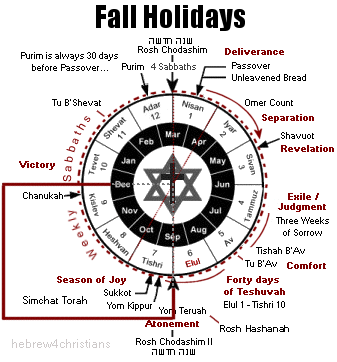|
Jewish Holiday Calendar
Note: For October 2015 site updates, please scroll past this entry....
The Jewish civil year begins in the fall, though the Biblical year begins in spring (Exod. 12:2). Preparations for the fall holidays begin with a thirty day period of teshuvah (repentance) during the (late summer) month of Elul. The following ten days begin with the Feast of Trumpets (i.e., Rosh Hashanah, on Tishri 1) and end with the Day of Atonement (i.e., Yom Kippur, on Tishri 10). These first ten days of the new year are called the "Ten Days of Awe" (i.e., aseret ye'mei teshuvah: עֲשֶׁרֶת יְמֵי תְּשׁוּבָה), or simply the Jewish "High Holidays." Just five days after the solemn time of Yom Kippur begins the joyous week-long festival of Sukkot ("Tabernacles"), which is immediately followed by the celebration of Simchat Torah.
The Fall Holidays:

The fall festivals prophetically indicate the Day of the LORD, the second coming of Yeshua, the great national turning of the Jewish people, and the establishment of the reign of the Messiah upon the earth during the Millennial Kingdom in the world to come.
Note that in accordance with tradition, holiday dates begin at sundown. Moreover, some holidays may be postponed one day if they happen to fall on the weekly Sabbath:
- Month of Elul (Fri. Aug. 14th [eve] - Sun. Sept. 13th [day])
- Month of Tishri (Sun. Sept. 13th [eve] - Mon. Oct. 12th [day])
- Month of Cheshvan (Mon. Oct. 12th [eve] - Wed. Nov. 11th [day])
- Month of Kislev (Wed. Nov. 11th [eve] - Fri. Dec. 11th [day])
- Four Sabbaths: Toldot, Vayetzei, Vayishlach, Vayeshev
- Dates for Chanukah 2015 (5776):
- 1st Chanukah candle - Sun. Dec. 6th [Kislev 25]
- 2nd Chanukah candle - Mon. Dec. 7th
- 3rd Chanukah candle: Tues. Dec. 8th
- 4th Chanukah candle: Wed. Dec. 9th
- 5th Chanukah candle: Thur. Dec. 10th
- 6th Chanukah candle: Fri. Dec. 11th (Shabbat Rosh Chodesh Chanukah)
- Month of Tevet (Fri., Dec. 11th [eve] - Sun. Jan. 10th [day])
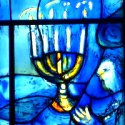 |
Note: Many Jewish calendars will list the first day of a holiday without indicating that the holiday actually begins sundown the night before... So, for example, while Chanukah begins Sunday, Dec. 6th at sundown, many calendars may indicate that it occurs on Monday, December 7th...
October 2015 Updates
The Spirit Makes Alive...
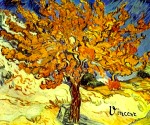
10.30.15 (Cheshvan 17, 5776) The Akedah of Isaac – Abraham's binding of his son in obedience to God's command – represents a psychologically impossible demand, and yet Abraham's passion leads us to ask what we are prepared to sacrifice? Our Lord Yeshua calls us to die to ourselves, to leave everything behind to follow him, and yet how can we honestly do this apart from a radical heart change, a transforming touch from heaven, the miracle of the Spirit making all things new for us? As Yeshua said: "It is the Spirit that makes life (ὸ πνεῦμά ἐστιν τὸ ζῳοποιοῦν); the flesh is no help at all" (John 6:63).
We tend to think of the "flesh" as the lower nature, revealed in the hunger of the alienated soul, etc., but it is also manifested in the aspiration of "religion" and other attempts to outwardly manage appearances or to control the soul itself. The Spirit of God gives us cherut (חֵרוּת), or the power to walk in real newness of life. οὗ δὲ τὸ πνεῦμα κυρίου, ἐλευθερία - "Where the Spirit of the LORD is present, there is liberty" (2 Cor. 3:17).
Making the Dead Alive...
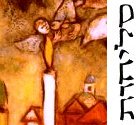
10.30.15 (Cheshvan 17, 5776) We must be careful not to confuse cause and effect in the realm of the spiritual. After the original transgression of Adam and Eve, death became the root problem of the human condition, so to speak, with indwelling sin as its fruit (i.e., the "works of the flesh"). It is this inherited "spiritual death" that causes sin. To focus on outward behavior without first of all dealing with the underlying problem of death is therefore a spiritual misstep. It is to clean the outside of the cup or to wash the outside of a tomb in a vain attempt to disguise the truth about our unclean and dead condition. The good news is not that God wants to make bad people good, but rather wants to make dead people alive... The cure for spiritual death is to be reborn and to partake of the resurrected life of Yeshua.
Following Yeshua is not a sort of "moral reformation" or self-improvement program to make us acceptable to God. Yeshua did not die on the cross so that we would become entangled in the old ways of being... No! He is Lord and Master and we find new life in His acts of deliverance done on our behalf and for our benefit. The temptation is always to go back to the law of sin and death (i.e., the principle of self-justification), but as Luther once said: "The sin underneath all our sins is the lie of the serpent that we cannot trust the love and grace of Christ and that we must take matters into our own hands."
"LORD, I need Thee every hour..." There never will be a time when we "get past" the need for God's grace given in Yeshua, since the only antidote to power of indwelling sin is the greater power of God's redeeming love within our hearts (1 John 3:8). The gospel is - not was - "the power of God for salvation (δύναμις θεοῦ ἐστιν εἰς σωτηρίαν) for everyone who believes" (Rom. 1:16); it is an ongoing source of power for our lives... Our identity is made secure in the finished work of the Messiah - we trust in His strength, not our own; it is "Messiah in you" that is the hope of glory (Col. 1:27). Just as we are given a new life entirely by means of God's grace, so we are also sanctified as we walk in that newness of life... "As you received Yeshua the Messiah the LORD, so walk in Him" (Col. 2:6). The focus is always on Yeshua and His righteousness and obedience... Every step of the way is a miracle and a wonder when we walk "in Messiah."
We walk "in Him," that is, in His strength, in His power, in His love... we don't walk "to" Him or attempt to climb the "stairway to heaven." Yeshua is the Way, the Truth, and the Life. He is the Bridge - sha'ar hashamayim (שַׁעַר הַשָּׁמָיִם) and the Divine Ladder upon whom the angels of God ascend and descend. We look to Him, not to ourselves for life. Because of the life of Yeshua within us, we are now able to bear fruit of the Holy Spirit as the Torah is written upon our hearts (Jer. 31:31). We are enabled to keep the Torah of Yeshua (תּוֹרָה יֵשׁוּעַ) because the life of Yeshua empowers us to do so...
Note: The coming of Messiah should not be regarded as the "second coming of Moses," friends... Something so radically new, powerful, and cosmic has happened in the miracle of "God with us" in Yeshua. Our LORD makes all things new! Abraham saw his day and rejoiced; Moses wrote of Him; the prophets testified of Him -- and the One who is greater than the earthly Temple is forevermore the healing Center of Reality.
Ahavat Olam - Everlasting Love

10.30.15 (Cheshvan 17, 5776) Salvation is "of the LORD" (לַיהוָה הַיְשׁוּעָה); we are not saved "by works of righteousness (מַעֲשֵׂי הַצְּדָקָה) that we have done, but solely on account of the mercy given to us in God our Savior (אֱלהִים מוֹשִׁיעֵנוּ; Titus 3:4-5). Grace excludes all boasting (Eph. 2:9; Rom. 4:4). We believe that God justifies the ungodly by trusting in his heart of compassion (Rom. 4:1-8). God loves us with "an everlasting love" (i.e., ahavat olam: אַהֲבַת עוֹלָם) and draws us in chesed (חֶסֶד, i.e., His faithful love and kindness). As it is written: "I love you with an everlasting love; therefore in chesed I draw you to me" (Jer. 31:3). Note that the word translated "I draw you" comes from the Hebrew word mashakh (מָשַׁךְ), meaning to "seize" or "drag away" (the ancient Greek translation used the verb helko (ἕλκω) to express the same idea). As Yeshua said, "No one is able to come to me unless he is "dragged away" (ἑλκύσῃ) by the Father (John 6:44). God's chesed seizes us, scandalizes us, takes us captive, and leads us to the Savior... Spiritual rebirth is a divine act, "not of blood nor of the will of the flesh nor of the will of man, but of God" (John 1:13). In everything - including human reason itself - the LORD God Almighty is preeminent.
מֵרָחוֹק יְהוָה נִרְאָה לִי
וְאַהֲבַת עוֹלָם אֲהַבְתִּיךְ
עַל־כֵּן מְשַׁכְתִּיךְ חָסֶד
me·ra·chok · Adonai · nir·ah · li
ve·a·ha·vat · o·lam · a·hav·tikh
al · ken · me·shakh·tikh · cha·sed

"The LORD appeared to me from far away.
I have loved you with an everlasting love;
therefore with lovingkindness have I drawn you."
(Jer. 31:3)

Hebrew Study Card
There is only One who offers you life, peace, and eternal healing, but it is offered on his terms, not your own. He makes you lay down in pastures of tender grass, he leads you beside the place of quiet waters (עַל־מֵי מְנֻחוֹת). He calls to your heart: "Come unto me, all you that labor and are heavy laden, and I will give you rest. Take my yoke upon you, and learn of me; for I am gentle and humble in heart: and you shall find rest for your souls. For my yoke is easy, and my burden is light" (כִּי עֻלִּי רַךְ וּמַשָּׂאִי קָל) [Matt. 11:28-30]. Thank God for the gracious love of our Savior Yeshua! Shabbat Shalom.
About Halloween...

10.30.15 (Cheshvan 17, 5776) About the pagan holiday of "Halloween" - it is written there is no spell or sorcery (i.e., nachash: נַחַשׁ) against Jacob, there is no divination (i.e., kesem: קֶסֶם) against Israel. At this time it must be said of Jacob and of Israel, 'Look at what God has done (מַה־פָּעַל אֵל)' [Num. 23:23]. No weapon formed against God's people shall prosper (Isa. 54:17), and the curse of the wicked is powerless against the tzaddikim (Prov. 26:2). Ein od milvado (אֵין עוֹד מִלְבַדּו) - God is the only true Power (Deut. 4:35; 1 Chron. 29:11; Rev. 4:11). Satan is an impostor and a foiled usurper. As Yeshua told his followers, "Behold I give to you authority to tread on serpents and scorpions and over all the power of the enemy, and nothing shall by any means hurt you" (Luke 10:19). Like Balaam and Haman, all those who curse God's people or attempt to foil His plans will be upended... Amen.
Pride and Paradox...

10.30.15 (Cheshvan 17, 5776) The message of the cross scandalizes human pride because it unconditionally declares there is nothing we can do to justify ourselves before God apart from the work of the Messiah rendered on our behalf. Human pride naturally wants to add something to the mix - by esteeming our will or our obedience to be determinative, but the Scriptures attest that we are declared righteous by trusting in the sacrifice of God for our souls, and not because of any merit of our own (Gal. 3:11). In other words, salvation is "of the LORD," and we are entirely hopeless apart the direct intervention of God for healing.... The Lord saves us, not because of works of righteousness (מַעֲשֵׂי הַצְּדָקָה) we might do, but solely on account of His mercy offered to us in Messiah our Savior (Titus 3:5).
In general, human pride has no quarrel with the theology of a transcendent, all-powerful, and holy God to whom we all owe obedience, and therefore religious systems based on "karma" are invariably amenable to human pride... A "First Cause" or a Source of Moral Law may present a religious demand upon the soul, but it presents no scandal to human reason. After all, the law of religion is simply "do what is good and you will be rewarded; do what is evil and you will be punished," and karma-based religions aim to effect a favorable "disposition" in the eyes of heaven. What is scandalous, however, and what is therefore entirely paradoxical to human reason, is that the Infinite One Himself became Finite and embodied as a human being, and that the infinitely transcendent One is also the entirely immanent One, pervading every possible world and every realm of creation -- including the "fallen" realm of humanity -- to become manifest in visage of Yeshua of Nazareth....
Again, it is relatively easy for human reason to concede awareness of a transcendental power that created the universe and who is the Source of Moral reality, but it cannot fathom how such Supreme Power could be made manifest in a state of weakness, identifying with what is most broken, most perverse, and most sick in the human soul and condition. The cross of Messiah is a scandal because human pride wants to deny the reality that humanity is incurably wounded, sick and without hope apart from divine intervention. Religious pride imagines that mankind is able to ascend the heights of heaven in its own strength, but the message of the cross is that God's love is so great that He is willing to descend - to willingly empty Himself to undergo shame, disgrace, condemnation - and indeed the horror of execution by crucifixion - all for the sake of our everlasting healing and salvation.
Do you want Torah that cuts to the bone? Do you want the raw, unvarnished truth? Then look to the cross of Messiah, the hallowed place (הַמָּקוֹם) where the transcendent, the all-powerful, and the holy are surrendered to become an object of horror, grief, and despair; where God's own glorious holiness and righteousness are exchanged for our sin... We must turn away from the urge to deny reality, by pretending that the salvation could be gained by some sort of self-improvement project, or by assuming that there exists some form of repentance that can take the place of the awful divine remedy given in our place. Turn to the cross and receive the death benefits of Messiah! "For I decided to know nothing among you except Yeshua the Messiah and him crucified" (1 Cor. 2:2).
Some people are reluctant to accept the truth of God's unconditional love because they fearfully imagine that doing so will lead to "lawlessness," or to a lax attitude that tolerates or even justifies sin. "Why not do evil that good may come?" they reason (Rom. 3:8). Such thinking grievously misunderstands the purpose of Torah, however, and fails to see that the "deeper Torah" allows us to walk in the light of God's truth. The goal (or "end") of the Torah is love - the divine love revealed in Messiah - and if we really love God, we will not seek an excuse to gratify our lower nature at the expense of our relationship with Him.
The scandal of the cross goes both ways, however... If human pride is offended at the truth about its hopeless condition, then God is offended when people deny or minimize the need for the cross of the Savior. When Peter sought to find an alternative cure for the fatal disease we all share, Yeshua said to him: "Out of my sight, Satan! You are a stumbling block (i.e., scandal: σκάνδαλόν) to me; for you do not have in mind the things of God, but the things of men" (Matt. 16:21-24). Do you want to know what outrages the Spirit of God? The denial of the cross and its eternal significance; the delusion that we can effect our own righteousness apart from God's grace. The "scandal of the cross" ultimately is a problem for human pride, and certainly not to the LORD God our Savior, who uses the cross to demonstrate the wisdom and power of God (1 Cor. 1:18). Those who deny the need for the cross, however, are left without remedy for their eternal condition (Heb. 10:26-31).
A scandal is a disgrace, a shame, an offence, even an outrage. The cross is scandalous because it represents the "death of God," that is, the sacrifice of God's transcendence, power, and holiness to become entirely identified with the fallenness of mankind. This is the shock the disciples had to face when they witnessed Yeshua die... The cross reveals that we are powerless to heal ourselves, and that the remedy is only found in the life given in our exchange. The exchange works both ways: We must deny ourselves - our pretenses, our supposed dignity, our inflated sense of self-importance - to receive what Yeshua has done by becoming our substitute. We must impute our sin to Him as our Sin-Bearer and impute His love to us as our Healer. We are crucified with Him, we are made part of that great exchange, by trusting in His work of salvation performed for us. We must be careful not to mock God. We don't give lip-service to what Yeshua has done and then revert to a pretense of righteousness based on self-determination or so-called "Torah observance."
We renounce our efforts to please God and surrender ourselves to His love and care. We trust in the work of Yeshua for our righteousness, not our own meritorious works. Salvation is "of the LORD" (לַיהוָה הַיְשׁוּעָה). Again, we are not saved "by works of righteousness (מַעֲשֵׂי הַצְּדָקָה) that we have done, but solely on account of God's mercy given to us in Messiah our Savior (Titus 3:5). Grace excludes all boasting (Eph. 2:9). We believe that God justifies the ungodly by trusting in his heart of compassion (Rom. 4:1-8). God loves us with "an everlasting love" (i.e., ahavat olam: אַהֲבַת עוֹלָם) and draws us in chesed (חֶסֶד, i.e., His faithful love and kindness). As it is written: אַהֲבַת עוֹלָם אֲהַבְתִּיךְ עַל־כֵּן מְשַׁכְתִּיךְ חָסֶד / "I love you with an everlasting love; therefore in chesed I draw you to me" (Jer. 31:3). Note that the word translated "I draw you" comes from the Hebrew word mashakh (מָשַׁךְ), meaning to "seize" or "drag away" (the ancient Greek translation used the verb helko (ἕλκω) to express the same idea). As Yeshua said, "No one is able to come to me unless he is "dragged away" (ἑλκύσῃ) by the Father (John 6:44). God's chesed seizes us, scandalizes us, takes us captive, and leads us to the Savior... Spiritual rebirth is a divine act, "not of blood nor of the will of the flesh nor of the will of man, but of God" (John 1:13). In everything - including human reason itself - the LORD God Almighty is preeminent.
The Temptation of Grace...
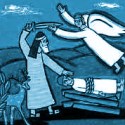
[ The following entry is related to this week's Torah reading, parashat Vayera.... ]
10.29.15 (Cheshvan 16, 5776) Since there are certain "Messianic" ministries that teach false doctrine, it is vital to remind ourselves that the righteousness of God is manifested apart from the law (χωρὶς νόμου), and that this righteousness was clearly witnessed by the law and the prophets (Rom. 3:21). The Apostle Paul warns that those who attempt to mix the old and new covenants are spiritual adulterers (Rom. 7:4-ff). After all, the goal of the Torah was the advent of the New Covenant given in Messiah (Gal. 3:17-19). The law was given to lead us to the Messiah and His Kingdom rule (Gal. 3:23-26), and indeed, the glory of the Torah of Moses was destined to fade away (2 Cor. 3:3-11), just as its ritual center (i.e., the Tabernacle/Temple) foreshadowed the greater Substance of the priesthood of God (Heb. 10:1; 13:10). There is really no ambiguity here: "Now we are released from the law, having died to that which held us captive, so that we serve in the new way of the Spirit and not in the old way of the written code (Rom. 7:6). "For what the law could not do, in that it was weak through the flesh, God sending his own Son in the likeness of sinful flesh, and for sin, condemned sin in the flesh: That the righteousness of the law might be fulfilled in us, who walk not after the flesh, but after the Spirit" (Rom. 8:3-4).
Note: For more on this important subject, please see "The Temptation of Grace."
The Ram of God...
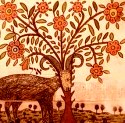
[ The following entry is related to this week's Torah reading, parashat Vayera.... ]
10.29.15 (Cheshvan 16, 5776) Consider how important was the ram that was substituted for Isaac... Had Isaac indeed been sacrificed on the altar, the nation of Israel would never have come into existence, and therefore the Messiah Himself would not have come. Therefore God's provision of the ram was meant to substitute and deliver all of Israel, and Isaac's willingness to offer his life foretells the passion and sacrifice of Yeshua. The sages say that the "ashes" of Isaac are gathered before the Throne of Glory, as if his willingness to offer himself is memorialized there forever. However, it is thanks to the ram (i.e., the lamb of God), that both Isaac and his merit as an offering survived the great test. Worthy is the Lamb who was slain! The cross is forever before God's Throne of Grace for us, chaverim.
In light of the sacrifice of Abraham's "only son" Isaac upon the altar at Moriah (i.e., the Akedah), we have all the more reason to affirm the glory of Yeshua our Messiah, the great Lamb of God (שֵׂה הָאֱלהִים) who takes away the sins of the world:
רָאוּי הַשֶּׂה הַטָּבוּחַ לְקַבֵּל גְבוּרָה
עשֶׁר וְחָכְמָה וְכּחַ וִיקַר וְכָבוֹד וּבְרָכָה
ra·uy · has·seh · ha·ta·vu·ach · le·ka·bel · ge·vu·rah,
o·sher · ve·chokh·mah · ve·ko·ach · vi·kar · ve·kha·vod · uv·ra·kha

"Worthy is the Lamb who was slain, to receive power and wealth and wisdom
and might and honor and glory and blessing" (Rev. 5:12)

Download Reading Card
Note: for more on this, see the "Passion of Isaac."
Waking Up in Time...

10.28.15 (Cheshvan 15, 5776) Our life in this world will end far sooner than we expect, and then what will become of us? I am not here thinking of the end of "the" world, but rather the end of your world - when you will die and face the light of eternity. Today, this moment, you are on the way, going someplace; your "latter days" are already come... If you are not prepared today, how will you be better prepared tomorrow? Today is the day of salvation, the hour that matters most (Psalm 95:7; Heb. 3:13). Learn to die to the world now, to let go of what presently holds you captive, so that you are free to meet that which forever shall come. Don't put off genuine teshuvah: turn while there is still time. And may God give us mercy to say from the heart: "For me to live is Messiah, and to die is gain" (Phil. 1:21).
Covenant and Love...

10.28.15 (Cheshvan 15, 5776) In Genesis chapter 17, God confirmed his covenant with Abraham by giving him the rite of circumcision, that is, brit milah (בְּרִית מִילָּה), a term that literally means "covenant of the word" (מִילָּה means "word" in Hebrew). It is important to note that the rite of circumcision never was intended to effect the promise of God but only to attest to it. Circumcision served as sign (אוֹת) or token of faith in the word of the LORD, that is, in God's loving promise. We see the connection by noting that the word "covenant" (i.e., brit: בְּרִית) appears exactly 13 times during this dramatic episode (i.e., Gen. 17:1-22), which is the same numeric value as the Hebrew word for love (i.e., ahavah: אַהֲבָה). Further note that the last occurrence of the word "covenant" in this section concerns God's exclusive choice of Isaac, Abraham's only true heir, the promised child who was chosen to be the "sacrificed seed" (Gen. 17:21). Indeed the very first time the word "love" appears in the Bible occurs when God asks Abraham to take his son, his "beloved" son, and to offer him as a whole burnt offering (Gen. 22:2), a clear picture of the message of Yeshua the Messiah:
"Please take your son... קַח־נָא אֶת־בִּנְךָ
your only (special, unique) son... אֶת־יְחִידְךָ
the one whom you love... אֲשֶׁר־אָהַבְתָּ
even Isaac... אֶת־יִצְחָק
and go to the land of Moriah and offer him as a burnt offering.
Note: For more on this subject, see "The Gospel According to Moses," "The Seed of Abraham," "The Sacrificed Seed," and related links on the Akedah.
Forsaking Self-hatred...
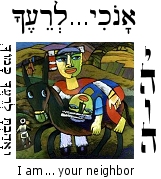
10.28.15 (Cheshvan 15, 5776) Allow God to love you. There is nothing left for you to do other than to open your heart and receive. "It is finished," were Yeshua's last words from the cross, meaning, "It has been perfected - it is complete and present for you; there is nothing left to add." Never, ever, give up hope; never believe that you are beyond the reach of God's love. Even in your worst moments, and despite your character defects and your many sins, God's sees what is beautiful and worthy of redemption in you. Yeshua stands at the door and knocks, asking for you to open the door of your heart to receive his love...
When we open our hearts to God's love and Presence, we are set free from the need to justify ourselves or to be admired by others; we let go of our fear of rejection and our hopeless perfectionism because we no longer need the acceptance or approval of others to understand our worth. God's love sets us free from the trap of comparing ourselves to others, and we are free to accept that we are accepted for who we are.
It is a terrifying possibility that we can disallow what we need most of all, and that we can choose the self-imposed exile of a loveless and tragic existence. Above all, then, we must repent of our self-hatred, of self-abuse, and we must forever repudiate the lie that we are unable to be truly loved and accepted by God... We must begin first of all with God's unconditional love for us revealed at the cross of Messiah, and only then we can move forward spiritually speaking...
God sees what He does within us, His "it-is-finished" work, the effect of His great salvation within our heart, even if at this present moment that may be hidden from our eyes... There is appearance, and there is reality; and only God sees what is ultimately real. We have to trust in His promise to be transformed into the divine nature, even if today we find ourselves sinful, needy, and in disrepair... By God's grace we are what we are. So don't give up. We are saved by hope (ἐλπίδι ἐσώθημεν, Rom. 8:24), and that hope is for you today.
Our hope is not founded upon our own supposed virtue or goodness, but rather in the goodness and compassion of the LORD our God. Salvation is "of the LORD" (יְשׁוּעָתָה לַיהוָה), which means that it is God's work performed on our behalf that redeems, heals, and beautifies. Therefore we recite the following blessing to express this truth of our acceptance: "Blessed are you, LORD our God, King of the Universe, who loves us despite ourselves..."
May you draw close to God's heart this very hour...
Heavenly Wordplay...
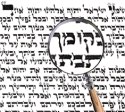
10.28.15 (Cheshvan 15, 5776) The Hebrew Scriptures are filled with various kinds of wordplay. In addition to some humorous play on words (i.e., puns), you will discover alliteration, acrostics, parables, similes, metaphors, hyperboles, gematria, and other literary devices. Many examples appear on the surface-level of the texts. Many examples appear on the surface-level of the texts. For example, "Adam" (אָדָם) is a play on the word adamah (אֲדָמָה, "ground"); Chavah (חַוָּה, "Eve") is a play on the word chai (חַי, "life"); Kayin (קַיִן, "Cain") is a play on the verb kanah (קָנָה, "to get"), Yitzchak (יִצְחָק, "Isaac"), plays on the verb tzachak (צָחַק, "to laugh"), and even the name "Jesus" (i.e., Yeshua: יֵשׁוּעַ) plays on the Hebrew word for deliverance or salvation (i.e., yeshuah: יְשׁוּעָה). Of course, many other examples could be cited...
Of particular relevance to this week's Torah portion (Vayera) is the name Yitzchak (יִצְחָק, "Isaac"), which plays on the verb tzachak (צָחַק, "to laugh"). The Torah records that God Himself named Isaac in response to Abram's and Sarai's laughter over the prospect of having a child in his old age (see Gen. 17:17-19; Gen. 18:12). Some scholars have suggested that tzachak is "onomatopoeic," that is, it imitates the sound of laughter itself. Appropriately enough, the root appears a number of times in the story of Isaac, though often with different connotations. The simple stem (kal) of tzachak conveys the idea of laughter, whether in joy or incredulity, though the stronger stem (piel) suggests more intense expressions, for example rejoicing, playing, and caressing -- or (negatively) mocking, scorning, and deriding. In other words, the motive for "laughter" is only contextually understood. After all, there's a big difference between laughing at someone and laughing with them (God's name for Isaac as "he laughs" (יִצְחָק) indicates that the LORD surely laughs with us and has a sense of humor).
For more on this subject, see "Hebrew Wordplay: Further Thoughts on Vayera."
Whisper of the Spirit...
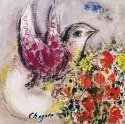
10.28.15 (Cheshvan 15, 5776) Many of us need to learn to let go, to rest, and to surrender to God's care for us. Some of us need to stop our religious activities to be able to hear the voice of the Spirit. When the prophet Elijah became exhausted, he fled to Mount Horeb – the very place of the Sinai revelation – to find refuge. When the Word of the LORD came to him, Elijah was asked "What are you doing here?" and then explained how his zeal had led him to the cave of fear and fatigue. God then told Elijah to stand on the mount, just as he had earlier told Moses to do so (Exod. 33:21-22). "And behold, the LORD passed by, and a great and strong wind tore the mountains and broke in pieces the rocks before the LORD, but the LORD was not in the wind. And after the wind an earthquake, but the LORD was not in the earthquake. And after the earthquake a fire, but the LORD was not in the fire. And after the fire the sound of a still and gentle whisper (דְּמָמָה דַקָּה). And when Elijah heard it, he wrapped his face in his cloak and went out and stood at the entrance of the cave. And behold, there came a voice to him and said, "What are you doing here, Elijah?" (1 Kings 19:11-13). Note how God repeated his initial question: "What are you doing here?" The Word speaks in a whisper so we will move closer to hear; He invites us to express our disappointment, exhaustion, frustration, and fear to him. Elijah wanted to lay down and die, but God wanted to strengthen his hope...
Shema: The Spirit speaks with a "still and gentle whisper" which will be inaudible unless we make room within ourselves to listen... If we entertain negative thoughts or messages, however, our spiritual receptivity will be impaired or damaged. For example, if we listen to news of this world and heed its messages of fear or anger, we squelch the whispering of the Holy Spirit. The Name YHVH (יהוה) means "God is Present" and near, as close as your heart and breath. The LORD is near, even when you feel lost and far away. We can attune ourselves to hear kol demamah dakkah (קוֹל דְּמָמָה דַקָּה), God's "still, small voice," when we are quieted, not when we are surrounded by the crowd with its cheers and its murmurings... God cannot be heard in noise and restlessness, much less in the fear-mongering and propaganda of this world. "God is the friend of silence. See how nature - trees, flowers, grass- grows in silence; see the stars, the moon and the sun, how they move in silence... We need silence to be able to touch souls."
Faith's Ongoing Passion...

10.28.15 (Cheshvan 15, 5776) From our Torah we read: "When Abram was ninety-nine years old the LORD appeared to him and said, "I am El Shaddai (אֲנִי־אֵל שַׁדַּי); walk before me and be perfect" (Gen. 17:1). The Talmud comments that if a person attempts to do a mitzvah but because of circumstances beyond his control cannot fulfill it, God regards it as if it were done (Berachot 6a). What matters here is the person's intent, the desire of the heart, and the sincere attempt to walk in faith before God. This is very different than someone who merely says he desires God's will but is devoid of any action: "For as the body apart from the spirit is dead, so also faith apart from works is dead" (James 2:26). Therefore it is said that God remembers the "ashes of Isaac" even though the Angel restrained Abraham's hand. Abraham's intent to obey invested the sacrificial act as substantive, as though it were actually accomplished. "Walk before me and be perfect" therefore means resolve your heart to hear and obey the Spirit of God. Being "perfect" means being complete in your trust, being "whole with your God..." (Deut. 18:13). May God help each of us be united with his heart.
Sorrowful yet Rejoicing...

10.27.15 (Cheshvan 14, 5776) It is written that "a joyful heart (לֵב שָׂמֵחַ) is good medicine" (Prov. 17:22). Where it says, "Serve the LORD with gladness" (Psalm 100:2), the sages note that "with gladness" (בְּשִׂמְחָה) contains the same letters as the word "thought" (מַחֲשָׁבָה), which suggests that happiness is found by thinking worthy thoughts. As the apostle admonished: "Think on these things" (Phil. 4:8). We find spiritual happiness when we choose to be thankful. This is called hakarat tovah (הַכָּרַת טוֹבָה), a phrase that means recognizing or being aware of the good. Cultivate a sense of wonder. Look at the sky often, for it is the "daily bread of the eyes." Albert Einstein once said, "There are two ways to live your life; one is as though nothing is a miracle, and the other is as though everything is." Happiness is a choice, a decision to see the good, to open your eyes to wonder, and to turn away from negative, fearful visions. The Torah of the LORD rejoices the heart (Psalm 19:8); let the heart of those who seek the LORD be glad (Psalm 105:3).
Father of the faithful...

10.27.15 (Cheshvan 14, 5776) Abraham is the "father of all who believe" in the miracle of the Promised Seed (הזרע הבטיח), that is, in the Coming Deliver who would bring redemption and healing to the whole world (see Gal. 3:16; Rom. 4:1-5:1). The Torah states that God chose Abraham because he would faithfully teach his children to guard "the way of the LORD" (דֶּרֶךְ יְהוָה), by trusting in God's acts of "righteousness and justice" (צְדָקָה וּמִשְׁפָּט) that He would perform according to his promise (Gen. 18:19). God regarded Abraham as faithful to retain His promise, and therefore He would manifest salvation (יְשׁוּעָה) through his descendants. The "way of the LORD" refers to Yeshua, "the way and the truth and the life" (הַדֶּרֶךְ וְהָאֱמֶת וְהַחַיִּים), the Promised Seed that would crush the head of the serpent in the battle for our redemption. Abraham's faith was directed toward the Deliverer to come, as Yeshua said: "Abraham rejoiced to see my day; and he saw it and was glad" (John 8:56). Likewise we guard the way of the LORD as our father Abraham did – by trusting in God's promises given to us in Yeshua our Messiah.
We are chosen to embody the same heart, vision, and mission of Yeshua our LORD, to exist as "extensions of his presence" in this world, and therefore we are also called to walk uprightly, as he walked... Indeed, the Hebrew word derekh (דֶּרֶךְ), usually translated as "way," metaphorically refers to the journey, manner, or course of your life. Because God is tov v'yashar (good and upright), he teaches his children to be yesharim (יְשָׁרִים), i.e., those who walk uprightly. Indeed, the way of the LORD (דֶּרֶךְ יהוה) is "to do acts of charity and justice" (לַעֲשׂוֹת צְדָקָה וּמִשְׁפָּט) (Gen. 18:19). This is the "straight way" (derekh ha-yashar), or the "narrow path" that leads to life (Matt. 7:14).
טוֹב־וְיָשָׁר יְהוָה
עַל־כֵּן יוֹרֶה חַטָּאִים בַּדָּרֶךְ
tov · ve·ya·shar · Adonai
al · ken · yo·reh · cha·ta·im · ba·da·rekh


"Good and upright is the LORD
therefore will he teach sinners in the way."
(Psalm 25:8)
Note that the verbal clause "he will teach" (i.e., יוֹרֶה) used in this verse comes from the root yarah (ירה) -- the same root used in the word Torah (תּוֹרָה). Because the LORD is good and upright, He gives us Torah (direction) for our lives. God educates us for eternity by imparting to us moral and spiritual truth. As King David taught, "Happy is the man who delights in the Torah of the LORD and meditates upon it day and night" (Psalm 1:1-2).
The Obedience of Faith...
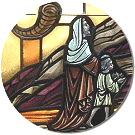
10.26.15 (Cheshvan 13, 5776) Some people think that works of righteousness (ma'asim tovim) demonstrate true faith, and yet it is possible to be entirely scrupulous in the performance of good works and yet be devoid of faith (Matt. 23:25). Indeed, Yeshua admonished that many will say, "Lord, Lord, didn't we ... do many mighty works in your name?" but he will reply: "I never knew you, depart from me you who are lawless..." (Matt. 7:22-23). When asked what must be done to do the "works of God," Yeshua answered: "This is the work of God – that you believe in the One whom he has sent" (John 6:29). Believing itself is the obedience, as Paul wrote: "the obedience of faith (ὑπακοὴν πίστεως) for the sake of His name" (Rom. 1:5). After all, faith in the LORD is the very first commandment of Torah (אָנכִי יְהוָה אֱלהֶיךָ), and the "work of faith" is to trust in His deliverance given in Yeshua the Messiah. Those who truly believe are justified by the righteousness of God, which is manifest in works of righteousness born by the power of the Spirit of God.
Many are scandalized by what they call "easy believism," or the idea that we only need to believe in Yeshua to be saved. Sometimes they call this teaching "cheap grace" or "sloppy agape," though in fairness it must be stressed that there is nothing easy about truly believing. What is easy, however, is professing that you believe without undergoing a miraculous heart transformation. Anyone can say, "I believe in Jesus," but the test is whether he lives within you. Is he the source of your life? Do you draw life from Him? Anyone can claim they are saved, but it is a miracle greater than splitting the sea to undergo divine metamorphosis, to be given a heart that loves unconditionally, that dies to pride, and that lives as the servant of all. Yeshua asks, "Do you really believe? Many will say to me in that day, 'Lord, Lord...' but I will say to them, 'I never knew you...' (Matt. 7:22-23). It's not just hard to believe (obey), it's impossible apart from God's radical intervention. It is the Spirit that gives life; the flesh is no help at all (John 6:33).
Living by faith does not mean we profess Christianity or "talk theology" like some college professor. It's one thing to believe that, and another to believe in... Human reason can rightly infer that a morally good, all-powerful Creator exists, for example (Rom. 1:20), but it is unable to know God's love that way... Love requires trust, "taking to the heart." We are to "know this day and turn to your heart (והֲשֵׁבתָ אֶל־לְבָבֶךָ) that the LORD is God in heaven above and on the earth beneath; there is no other" (Deut. 4:39). We need to know truth (cognitive) and to be moved by the heart (emotional); we need both Spirit and Truth (John 4:24). "For all things come from You (כִּי־מִמְּךָ הַכּל), and from your hand we give to you" (1 Chron. 29:14). Teshuvah centers on Yeshua our Savior: turn to believe in Him!
Abraham and the Lamb...

10.26.15 (Cheshvan 13, 5776) The word "love" first appears in the Torah regarding Abraham's passion for his son: "Take your son, your only son Isaac, whom you love, and go to the land of Moriah, and offer him there as a burnt offering on one of the mountains of which I shall tell you" (Gen. 22:2). After journeying to the place, Abraham bound Isaac, laid him upon an altar, and raised his knife to slay him. At the very last moment, the Angel of the Lord called out: "Abraham! Abraham! Do not lay your hand on the lad or do anything to him, for now I know that you fear God, seeing you have not withheld your son, your only son, from me" (Gen. 22:11-12). Abraham then "lifted up his eyes" and saw a ram "caught in a thicket" which he offered the place of his beloved son. Abraham named the altar Adonai-Yireh, "the LORD who provides" (Gen. 22:14). The sacrifice of the lamb for Isaac portrayed the sacrifice of Yeshua, the great 'Lamb of God' (שֵׂה הָאֱלהִים) who would offer up his life in exchange for the trusting sinner (John 1:29). Indeed the story of how God provided the lamb - both at Moriah and later during the great Passover in Egypt - may be understood as the "Gospel according to Moses" (Luke 24:27; John 5:46).
Isaac not only pictures the sinner who trusts in God's sacrificial substitute, but also the One who offered himself in obedience to his heavenly Father. The Promised Seed illustrates how Yeshua "humbled himself by becoming obedient to the point of death, even death on a cross" (Phil. 2:7), and in that sense he is a type of Messiah. For instance, both Isaac and Yeshua were born miraculously; both were called "only begotten sons"; both were to be sacrificed by their fathers at Moriah; both experienced a "passion"; both willingly took up the means of his own execution; both were to be resurrected on the third day (Gen. 22:5, Heb. 11:17-19); and both demonstrate that one life can be sacrificed for another – the ram for Isaac, and Yeshua for all of mankind...
The first time the word "Torah" occurs in the Bible refers to the faith of Abraham (Gen. 26:5), and the second time refers to the law of Passover: "There shall be one teaching (Torah) for the native and for the stranger" (Exod. 12:49). There is a link here. Abraham lived before the time of the Exodus, of course, and therefore he observed Passover by offering the lamb in place of his son (Gen. 26:5). Abraham revealed that the inner meaning of Torah is that the "righteous shall live by faith" (Hab. 2:4, Rom. 1:17) and that God justifies the sinner who trusts in him (Heb. 11:17-19; Rom. 4:5). During the Exodus from Egypt, Moses declared that the blood of the Passover lamb would be a "sign" of imputed righteousness secured by faith - with no "leaven," or human works, added. This is the "life-for-life" principle that underlies the sacrificial system of the Tabernacle revealed at Sinai as well. Ultimately all true Torah points to Yeshua, the Lamb of God (שֵׂה הָאֱלהִים), who died upon the cross for our offenses and was raised again for our justification (Rom. 4:25).
"God will provide Himself a Lamb - my son..." The cross itself speaks to the question of "faith vs. works." At the time of the crucifixion of the Messiah, man was "shut out" because of the darkness and utter sanctity of the sacrifice of Yeshua as the Lamb of God who bore all the sins of the world... At the time of utmost darkness, man was shut out, put into a "deep sleep" not unlike what Abraham had earlier experienced at the covenant of the parts (Gen. 15:12). Every human being stood helplessly on the other side of the cross; no one else participated to make us right with God: It was all Yeshua and the Father, and the Father and Yeshua alone... In that inner sanctum, that holy of holies, atonement was made.
The Work of Faith...
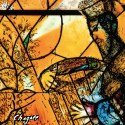
10.26.15 (Cheshvan 13, 5776) James the Righteous said that Abraham was "justified by works" by offering his son Isaac upon the altar (James 2:21), but surely this refers to the work of faith (τό ἔργον τῆς πίστεως) and not to the works of the law (מַעֲשֵׂי הַתּוֹרָה) - since the Torah explicitly prohibited human sacrifice (Gen. 9:5; Lev. 18:21; 20:2; Deut. 12:31; Jer. 32:35), and therefore the Angel of the LORD (מַלְאַךְ יְהוָה) restrained Abraham's hand during the great test of faith (Gen. 22:12). When James therefore stated that Abraham was "justified by his works" (ἐξ ἔργων ἐδικαιώθη), he implied that our actions ultimately reveal the inner life of faith. On the other hand, the apostle Paul's seemingly contrary statement that Abraham was not justified by works (Rom. 4:1-3) refers to his unwavering confidence in God's promise that his descendants would be as numerous as the stars in the heavens (Gen. 15:1-6). There is no real contradiction, then, since the two apostles were referring to two different episodes in their discussion of justification...
Some people think that true faith leads to works of righteousness, and yet it is possible to be entirely scrupulous in the performance of good works and yet be devoid of genuine faith (Matt. 23:25). Indeed, many will say, "Lord, Lord, didn't we ... do many mighty works in your name?" but the Lord will reply: "I never knew you..." (Matt. 7:22-23). When asked what must be done to do the "works of God," Yeshua answered: "This is the work of God – that you believe in the One whom he has sent" (John 6:29). Believing itself is the obedience, as Paul wrote: the obedience of faith (ὑπακοὴν πίστεως) for the sake of His name" (Rom. 1:5). After all, faith is the very first commandment of Torah (אָנכִי יְהוָה אֱלהֶיךָ), and the "work of faith" is to trust in God's deliverance given in Yeshua the Messiah. Those who truly believe are justified by the righteousness of God, which is manifest in works of righteousness born by the power of the Spirit of God.
Parashat Vayera - וירא

[ The following entry is related to this week's Torah reading, parashat Vayera. Please read the Torah portion to find your place here. ]
10.25.15 (Cheshvan 12, 5776) Our Torah reading for this week (Vayera) is very dramatic and extraordinarily prophetic. Among other things it includes what I have called the "Gospel according to Moses," or rather Moses' account of how Abraham was tested by God to offer his "only begotten son" (בֵּן יָחִיד) as a sacrifice on Mount Moriah -- the place of the future Temple. This famous story is referred to as the Akedah (עֲקֵדָה), or Akedat Yitzchak (עֲקֵידָת יִצְחָק) - the "binding of Isaac" (Gen. 22:1-18). At the very last moment, the Angel of the LORD stopped Abraham from going through with the sacrifice and provided a ram as a substitute. Abraham then named the location Adonai-Yireh (יהוה יִרְאֶה), "the LORD will provide/see" (from the 3p impf. of the verb ra'ah (רָאָה), "to see"). The binding of Isaac perfectly illustrates both the principle of sacrificial love and the principle that we must first unreservedly believe in that love in order to understand the ways of the LORD.
As Messianic believers, we understand the Akedah as a foreshadowing of the ultimate sacrifice the heavenly Father would give on our behalf. Unlike Abraham, God the Father actually offered His only begotten Son (בֵּן יָחִיד) Yeshua upon Moriah in order to make salvation available to all who believe (John 3:16-18; 1 John 4:9). As Abraham himself believed: אֱלהִים יִרְאֶה־לּוֹ הַשֶּׂה / Elohim yireh-lo haseh ("God Himself will provide a lamb").
אֱלהִים יִרְאֶה־לּוֹ הַשֶּׂה לְעלָה בְּנִי
E·lo·him · yir·eh-lo · has·seh · le·o·lah · be·ni

"God will see for himself the lamb for the burnt offering -- my son."
(Gen. 22:8)
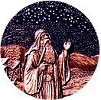
Indeed, the very first occurrence of the word love in the Scriptures (i.e., ahavah: אַהֲבָה) refers to Abraham's love for his "only" son who was to be sacrificed as a burnt offering on Moriah (the very place of the crucifixion of Yeshua), a clear reference to the gospel message (Gen. 22:2; John 3:16). Some scholars have noted that the word ahavah comes from a two-letter root (הב) with Aleph (א) as a modifier. The root means "to give" and the Aleph indicates agency: "I" give (i.e., the Father gives). Love is essentially an act of sacrificial giving... The quintessential passage of Scripture regarding love (αγαπη) in the life of a Christian is found 1 Corinthians 13: "Love seeks not its own..."
Whereas the Akedat Yitzchak foreshadowed God's provision for the coming Temple, the Akedat Yeshua (i.e., the crucifixion of Yeshua at Moriah) was the altar where the justice and chesed (love) of the Father fully met. For more on this incredibly rich subject, please see the articles, "The Passion of Isaac" and "The Sacrificed Seed."
The Blessing of God...

10.23.15 (Cheshvan 10, 5776) Every Sabbath we say the "priestly blessing" (ברכת כהנים), the great expression of hope and grace that transforms us into "name bearers" of God (Num. 6:24-27). The blessing of the LORD guards us from illusion, directing our hearts to focus on what matters most. God's radiance changes us, revealing the miracle of grace. As the LORD "lifts up his face," he discloses his Presence within all things, and imparts to us his healing peace. God's Name is "put upon" us so that we become vessels that carry redemptive love and healing to the world. We are endowed with divine energy to be made fruitful; we are empowered to serve God in the truth. The awareness of our blessedness reaches into every moment, and we begin to see all of life as sanctified, sacred, full of wonder and meaning.
יְבָרֶכְךָ יְהוָה וְיִשְׁמְרֶךָ
יָאֵר יְהוָה פָּנָיו אֵלֶיךָ וִיחֻנֶּךָּ
יִשָּׂא יְהוָה פָּנָיו אֵלֶיךָ וְיָשֵׂם לְךָ שָׁלוֹם
ye·va·re·khe·kha Adonai ve·yish·me·re·kha;
ya·eir Adonai pa·nav e·ley·kha vi·chun·ne·ka;
yis·sa Adonai panav e·ley·kha ve·ya·sem le·kha sha·lom

"The LORD bless you and guard you;
The LORD make his face to shine upon you and be gracious to you;
The LORD lift up his countenance upon you and give you peace."
(Num. 6:24-26)

Download Study Card
Shabbat Shalom and may the "Name above all names" rest upon you, dear friends... Amen.
Life out of Death...

[ The following entry is related to this week's Torah reading, parashat Lekh-Lekha.... ]
10.23.15 (Cheshvan 10, 5776) When Abram was ninety-nine years old the LORD appeared to him and said, "I am El Shaddai (אֲנִי־אֵל שַׁדַּי); walk before me, and be perfect" (Gen. 17:1). Since the name El Shaddai depicts the image of a nursing mother (see below), perhaps this revelation was meant to remind Abram and Sarai that God would be the Womb, the Sustenance, and the Substance of the coming promised Seed. Only God can bring life out of death - even life from the deadness of Sarai's womb (Rom. 4:19). For this reason, both Sarai and Abram were renamed by adding the letter Hey (ה), a letter that symbolizes the Holy Spirit of God. The promised Seed was to be born miraculously, not unlike the virgin birth of the Messiah reported in the Gospels.
וַיּאמֶר אֵלָיו אֲנִי־אֵל שַׁדַּי
הִתְהַלֵּךְ לְפָנַי וֶהְיֵה תָמִים
vai·yo·mer · e·lav · a·ni · El · Shad·dai
hit·ha·lekh · le·fa·nai · ye·he·yeh · ta·mim

And He said to him [Abram]: "I am El Shaddai, walk before Me and be perfect
[i.e., complete in faith, mature, wholehearted]"
(Gen. 17:1)

The Promised Seed...
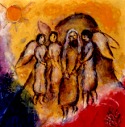
10.23.15 (Cheshvan 10, 5776) The story of Abraham is highly prophetic of the coming Messiah, and the promises given to him foretell of the advent of Yeshua in unmistakable ways. After the Akedah (i.e., the sacrifice of Isaac), God promised that "in your seed (זֶרַע) shall all the nations of the earth be blessed, because you have obeyed my voice" (Gen. 22:18). In light of the New Testament, the faith of Abraham - and especially the faith demonstrated by the Akedah - prefigured the justification of the nations through faith. Therefore we read: "And the Scripture, foreseeing (προοράω) that God would justify the nations by faith, proclaimed the gospel (προευαγγελίζομαι) beforehand to Abraham, saying, "In you shall all the nations be blessed" (Gal. 3:9). It is noteworthy that Abraham received this promise as a Gentile, since he was yet given the commandment of brit milah (circumcision) as a token of Jewish identity. Abraham was therefore uncircumcised when he believed the good news of the coming redemption of mankind (Rom. 4:10-12). Therefore the Apostle calls Abraham the father of faith for those Gentiles who would later believe the good news of redemption in Yeshua. "So then, those who are of faith are blessed along with Abraham, the man of faith" (Gal. 3:9; Rom. 4:16).
For more on this subject, see "The Seed of Abraham: Further thoughts on Lekh-Lekha."
Hidden Life in God...

10.23.15 (Cheshvan 10, 5776) It is said that the tzaddikim (righteous ones) are "doubly called" by God: "Abraham, Abraham" (Gen. 22:11), "Jacob, Jacob" (Gen. 46:2), "Moses, Moses" (Exod. 3:4), "Samuel, Samuel" (1 Sam. 3:10), "Saul, Saul" (Acts 9:4), and so on, to indicate that the LORD calls once to each soul in this world (olam hazeh) but a second time to each soul who will in the world to come (olam haba) by means of his grace... When God told Abram to "get out of your land," he called him to focus on heavenly places – to find his identity there. "Seek ye first the kingdom of God..." (Matt. 6:33). Thus David says, "I shall walk before the LORD in the land of the living" (Psalm 116:9), which means all his deeds would be done for the sake of heaven. The earth then becomes the "land of the living," or "the land that I will show you," as Abram was told (Gen. 12:1). Likewise, followers of Yeshua no longer find their identity in this world but rather through their spiritual union with the resurrected LORD (Gal. 2:20; 6:14; Eph. 1:3; 2:6)... Therefore we are told to "seek the things that are above (τὰ ἄνω ζητεῖτε) where the Messiah is seated at the right hand of God; focus your thoughts on the things above - not on things here on earth - for you have died, and your life has been hidden (κέκρυπται) with Messiah in God. Then when the Messiah, who is your life, appears, you too will appear with him in glory" (Col. 3:1-4).
So have you heard the "upward call of God in Yeshua the Messiah" (Phil. 3:14)? This "upward call" (τῆς ἄνω κλήσεως) is the invitation from above, the sound of the heavenly Voice, beckoning you to enter the "high country" of the world to come. As Yeshua said, "I am from above (ἐγὼ ἐκ τῶν ἄνω)." Our true identity is not found in this world and its vain philosophy. The cross brings these things to an end, as we "cross over" from the realm of the dead to the realm of life (Gal. 6:14). Can you say: "I have been crucified with Messiah. It is no longer I who live, but Messiah who lives in me. And the life I now live in the flesh I live by faith in the Son of God, who loved me and gave himself for me" (Gal. 2:20)?
The great commandment is always Shema - listen - and heed God's Voice: "And your ears shall hear a word behind you, saying, "This is the way, walk in it," when you turn to the right or when you turn to the left (Isa. 30:21). At any given moment of our day, then, we can attune ourselves to hear the "upward call" and come "boldly before the Throne of Grace" (Heb. 4:16). The world knows nothing of this realm and is enslaved by appearances and the delusions of this realm, olam hazeh. As Yeshua said, "To you it has been given to know the mysteries of the kingdom of heaven, but to them it has not been given" (Matt. 13:11). The Spirit always says, "Come, my people, enter your chambers, and shut your doors behind you" (Isa. 26:20). The LORD beckons: "Call to me and I will answer you, and will tell you great and hidden things that you have not known" (Jer. 33:3). And I looked, and behold, a door standing open in heaven! And the first voice, which I had heard speaking to me like a trumpet, said, "Come up here, and I will show you..." (Rev 4:1). The repeated or "double call" of heaven is the voice of love. The Beloved calls out to the beloved: "Arise, my love, my beautiful one, and come away" (Song 2:10, 2:13).
Surrender to Peace...

10.23.15 (Cheshvan 10, 5776) "Be still and know that I AM God" (Psalm 46:10). This is something you must do; you must learn to quiet your heart to know the Divine Presence. Therefore "set the LORD always before you" (Psalm 16:8) and refuse anxious thoughts that weigh in upon you, creating pressure and "dis-ease." Quieting your heart enables you to hear the holy whisper: "It is I; do not be afraid..." Once the storm of fear dissipates, you can know the truth of God. As the Spirit says, "In returning and rest you shall be saved; in quietness and in trust shall be your strength" (Isa. 30:15). Worry is a place of exile and pain. Since God's Name (יהוה) means "Presence" and "Love," being anxious is to "practice the absence" of God's presence instead of practicing his presence... A divided house cannot stand. Where it is written, "cast all your anxiety on him because he cares for you" (1 Pet. 5:7), the word translated "anxiety" (μέριμνα) comes from a verb (μερίζω) that means to divide into pieces. Bring, then, your brokenness to God – including those distractions that make you ambivalent and afraid – to receive God's healing for your divided heart...
הַרְפּוּ וּדְעוּ כִּי־אָנכִי אֱלהִים
אָרוּם בַּגּוֹיִם אָרוּם בָּאָרֶץ
har·pu · u·de·u · ki · a·no·khi · E·lo·him
a·rum · ba·go·yim · a·rum · ba·a·retz

"Be still (i.e., let go, surrender) and know that I am God,
I will be exalted among the nations, I will be exalted in the earth"
(Psalm 46:10)

Hebrew Study Card
Note that the verb "be still" (i.e., rapha: רָפָה) means to "let go," "stop striving," to "relinquish control," and to surrender your life and the fate of the world to the care of God... "Being still" means finding serenity and inner peace in the midst of God's providential plans for good... We find peace as we trust God's will for our the outcome of our lives, without "taking thought" for tomorrow and its concerns (Matt. 6:34).
Note: For more on this topic, see "Surrender to Peace." Shabbat Shalom!
Justification by Faith...

[ The doctrine of "justification by faith" predates Martin Luther by thousands of years... ]
10.22.15 (Cheshvan 9, 5776) From our Torah for this week (Lekh-Lekha) we read: "And he believed in the LORD, and He counted it to him as righteousness" (Gen. 15:6). Like our father Abraham, we are made right with God (i.e., "justified") by trusting in God's promises (Rom. 4:20-25). In the Talmud (Makkot 23b-24a) it says, "Moses gave Israel 613 commandments, David reduced them to eleven (Psalm 15), Isaiah to six (Isaiah 33:15-16), Micah to three (Micah 6:8), Isaiah reduced them again to two (Isaiah 56:1); but it was Habakkuk who gave the one essential commandment: ve'tzaddik be'emunato yich'yeh (וְצַדִּיק בֶּאֱמוּנָתוֹ יִחְיֶה), literally, "the righteous one, by his trust, shall find life" (Hab. 2:4). The New Testament likewise distilled the various commandments to the principle that we find life by trusting in God (see Rom. 1:17, Gal. 3:11, and Heb. 10:38). Spiritual life is the blessing of faith, since apart from faith we are spiritually dead and "powerless (ἀδύνατος) to please God" (Heb. 11:6). As King David said, "The LORD is near to all who call upon Him - to all who call upon Him in the truth" (Psalm 145:18). God is near to the honest soul who confesses the truth about his need, just as God distances himself from the proud and puffed up soul:
הִנֵּה עֻפְּלָה לא־יָשְׁרָה נַפְשׁוֹ בּוֹ
וְצַדִּיק בֶּאֱמוּנָתוֹ יִחְיֶה
hin·nei u·pe·lah lo ya·she·rah naf·sho bo
ve·tzad·dik be·e·mu·na·to yich·yeh

"Behold, his soul is puffed up; it is not upright within him,
but the righteous shall find life by means of his trust."
(Hab. 2:4)

Hebrew Study Card
Note: For more see, "Justification by Faith: Further thoughts on Lekh-Lekha."
On Being a true Jew...
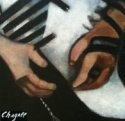
[ The following entry is related to this week's Torah reading, parashat Lekh-Lekha.... ]
10.22.15 (Cheshvan 9, 5776) As I mentioned the other day, the word "Hebrew" (עִברִית) "boundary crosser," though the word "Jew" means one who praises the LORD (יְהוּדָה). The word "Jew" (יְהוּדִי) comes from a root (יָדָה) which means to "thank" or to "praise" (Gen. 29:35). The Apostle Paul alluded to this by saying that one whose heart has been circumcised by the Spirit is "one who is praised by God -- not by men" (Rom. 2:29). Being a Jew therefore means being "chosen" to receive blessings and grace to live in holiness for the glory of God and for the healing of the world. The performance of various commandments are for the greater purpose of tikkun olam (תיקון עולם), the "repair of the world," in order to reveal God's goodness and love (Eph. 2:8-10). Doing so makes someone a Jew, since his praise comes not from man, but from the LORD himself. God is the source and the power of what makes a true tzaddik (righteous person). After all, Israel was meant to be a "light to the nations" (Isa. 42:6; 60:3), and God had always planned for all the families of the earth to come to know Him and give Him glory through his chosen servant Abraham (Gen. 12:3; 22:18). "Jewishness" is therefore not an end in itself but rather a means to bring healing to the nations... Indeed, the entire redemptive story of the Scriptures centers on the cosmic conflict to deliver humanity from the "curse" by means of the "Seed of the woman" who would come. The gospel is Jewish because it concerns God's great redemptive plan for the whole world (John 3:16; 4:22).
Note: For more on this see "The Father of all who Believe."
Trusting in the Unseen Good...
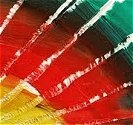
10.22.15 (Cheshvan 9, 5776) An honest theology must find a place for mystery, for "seeing through a glass darkly" (ἐν αἰνίγματι) and for the apprehension of awe and wonder. Philosophy (not science) asks the question: "Why is there something rather than nothing at all?" This is a question regarding the "why" of existence itself, the profusion of life as it surrounds us. Is there a reason for existence, a purpose, a direction, a radical meaning? Faith "sees what is invisible" by experiencing reality as revelation: the mystery of life points beyond itself to God's creative and sustaining presence: "In Him we live and move and have our being" (Acts 17:28). Cut open a seed and what do you see, but "the hidden power that makes the fruit grow toward the sky." Likewise what is most real about us is shrouded in mystery. We are finite, our lives are short and bounded by darkness, yet we sense God's Spirit, the hidden power that upholds our souls, and we trust that we will indeed live forever because of God's love. As Paul Tillich wrote: "The question of being is not the question of any specific being, its existence and nature, but it is the question of what it means to be. It is the simplest, most profound, and absolutely inexhaustible question – the question of what it means to say something is. The word "is" hides the riddle of all riddles, the mystery that there is anything at all." Though we might try to explain God by way of doctrine, in the end it is the mystery of "Messiah in you - the hope of glory" (Col. 1:27).
We walk by faith, not by sight - by hearing the Word of God, heeding what the Spirit of God is saying to the heart... For now we "see through a glass darkly," which literally means "in a riddle" (ἐν αἰνίγματι). A riddle is an analogy given through some resemblance to the truth, though quite often the correspondences are puzzling and obscure. Hence, "seeing through a glass darkly" means perceiving obscurely or imperfectly, looking "through" something else instead of directly apprehending reality. We see only a reflection of reality, and our knowledge in this life is indirect and imperfect. This is contrasted with the "face to face" (פָּנִים אֶל־פָּנִים) vision and clarity given in the world to come, when our knowledge will be clear and distinct, and the truth of God will be fully manifest and no longer hidden. Being "face to face" with reality means being free of the riddles, the analogies, the semblances, etc., which at best adumbrate our way.. Such reflection should make us humble whenever we share our faith, for "now we know in part, but then shall we know in whole" (1 Cor. 13:12). As it is written in our Scriptures: "For in hope we were saved, but hope that is seen is not hope, because who hopes for what he sees?" (Rom. 8:24).
Our inner life as a child of God is a "hidden mystery," too. As Yeshua said: "Flesh and blood give birth to flesh and blood, but the Spirit gives birth to things that are spiritual" (John 3:6). We cannot "carnally" experience the miracle of rebirth; we cannot know our hidden identity based on the testimony of the five senses (1 Cor. 2:14; 2 Cor. 5:16). We "walk by faith, not by sight," and that means understanding that though our physical life on this earth will one day end, our spiritual life remains forever.. And while we cannot see or fully understand our spiritual birth, we must simply believe it and walk out our days here as sojourners (תּוֹשָׁבִים) on our way to a deeper place of love, healing, and eternal remedy. In this world we pass through "the valley of the shadow (צֵל) of death" (בּגֵיא צַלְמָוֶת), we will not fear, since God is faithful to lead us that that divine place, giving us the comfort of his Spirit and along the way, and one day we will dwell in a city whose builder and maker is God (Heb. 11:10).
The Primacy of Truth...

10.21.15 (Cheshvan 8, 5776) In Hebrew, the word for truth, i.e., emet (אֱמֶת), contains the first, middle, and the last letter of the Hebrew alphabet, indicating that truth encompasses all things and endures from the beginning (א) to the end (ת). The sages sometimes say "the seal of God is truth," since the final letters of the three words that conclude the account of creation, namely, bara Elohim la'asot ("God created to do" [Gen. 2:3]), spell the word emet. The word for falsehood, on the other hand, is sheker (שֶׁקֶר), composed of letters near the end of the alphabet, suggesting instability, impermanence, and distance from God. Indeed the letter Aleph represents the preeminent and ineffable glory of God, but if we remove Aleph from the word emet, we are left with the word "dead" (i.e., met: מֵת), the opposite of life (i.e., chayim: חַיִּים). Therefore, if we attempt to ignore or suppress God in our understanding of truth, we end up with death. And since Yeshua told us, "I am the way (הַדֶּרֶךְ), the truth (הָאֱמֶת), and the life (הַחַיִּים); no one comes to Father apart from me" (John 14:6), those who deny His reality are in a state of spiritual death.
אָנכִי הַדֶּרֶךְ וְהָאֱמֶת וְהַחַיִּים
וְאִישׁ לא־יָבא אֶל־הָאָב בִּלְתִּי עַל־יָדִי
a·no·khi · ha·de·rekh · ve·ha·e·met · ve·ha·chai·yim
ve'ish · lo · ya·vo · el · ha·av · bil·ti · al · ya·di

"I am the way, and the truth, and the life.
No one comes to the Father apart from my hand."
(John 14:6)
Hebrew Study Card
Of the thirteen attributes revealed to Moses that defined the Name YHVH (Exod. 34:6-7), two are joined together. The LORD is rav chesed ve-emet (רַב־חֶסֶד וֶאֱמֶת), abundant in lovingkindness and truth, indicating that his love is always a part of reality... In other words, just as God's Name means "presence" and "breath," it also means "compassion" and "love." As Yeshua said: "I am the Aleph and the Tav," says the LORD God (יְהוָה אֱלהִים), "the One who is and who was and who is to come, the Lord of Hosts (יְהוָה צְבָאוֹת)."
It's been said that the ancient Greek mindset regarded what is beautiful as what is good, whereas the Hebraic mindset regarded what is good as what is beautiful. The difference is radical. Doing our duty before God, in other words, is what is truly beautiful, not merely appreciating the appearance of symmetry, order, balance, and so on. This explains why moral discipline (i.e., musar, מוּסָר) is so prominent in Hebrew wisdom literature. In the spiritual sense, beauty cannot exist apart from moral truth, and moral truth cannot exist apart from "doing the truth" through acts of righteousness...
The Meaning of "El Shaddai..."

10.21.15 (Cheshvan 8, 5776) From our Torah portion this week (Lekh-Lekha) we read how God appeared to Abram and said to him, "I am El Shaddai (אֵל שַׁדַּי); walk before me, and be perfect" (Gen. 17:1). Most English translations render El Shaddai as "God Almighty," probably because the translators of the Septuagint (i.e., the ancient Greek translation of the Torah) thought Shaddai came from a root verb (i.e., shadad: שָׁדַד) that means "to overpower" or "to destroy." Jacob's blessing given in Genesis 49:25, however, indicates that Shaddai might be related to the word for breasts (i.e., shadayim: שָׁדַיִם), indicating sufficiency and nourishment (i.e., "blessings of the breasts and of the womb" (בִּרְכת שָׁדַיִם וָרָחַם)). In this case, the word shaddai might derive from the contraction of sha ("who") and dai ("enough") to indicate God's complete sufficiency to nurture the fledgling nation into fruitfulness. Indeed, God first uses this Name when He refers to multiplying Abraham's offspring (Gen. 17:2). Understood in this light, the name El Shaddai provides a picture of God's nurturing love for our lives... Dayenu! God sustains us and loves us, like a mother who loves her newborn child...
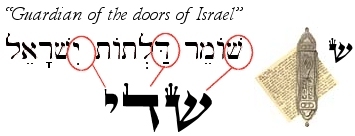 |
Note: For more on this topic, see "God as El Shaddai: Further thoughts on Lekh-Lekha."
The Father of Faith...

[ The following entry is related to this week's Torah reading, parashat Lekh-Lekha.... ]
10.20.15 (Cheshvan 7, 5776) In parashat Lekh Lekha Abram is called ha-ivri (הָעִבְרִי) - "the Hebrew," a term that means "one who has crossed over" (עָבַר) from another place. Rashi identifies this "other place" as Ur of the Chaldees (אוּר כַּשְׂדִים), located east of the Euphrates River, though the midrash (Genesis Rabbah) symbolically identifies it as the realm of idolatry: "The whole world stood on one side, but Abram crossed over to the other." Abram separated himself from a world steeped in idolatry and polytheism by worshiping the One LORD God who is the sole Creator of all things.... Understood in this way, being "Hebrew" means being regarded as an "other," a "stranger," or an "outsider" to idolatrous world culture. Similarly, all those who "cross over" from the realm of death to life because of Yeshua our Savior are rightly called "Hebrews" (John 5:24).
אָמֵן אָמֵן אֲנִי אוֹמֵר לָכֶם
הַשּׁוֹמֵעַ אֶת דְּבָרַי וּמַאֲמִין לְשׁוֹלְחִי
יֶשׁ לוֹ חַיֵּי עוֹלָם וְאֵינוֹ בָּא בְּמִשְׁפָּט
כִּי אִם עָבַר מִמָּוֶת לְחַיִּים
a·men · a·men · a·ni · o·mer · la·khem
ha·sho·me·a · et · de·va·rai · u·ma·a·min · le·shol·chi
yesh · lo · cha·yei · o·lam, · ve·ei·no · ba · be·mish·pat
ki · im · a·var · mi·ma·vet · le·cha·yim

"Truly, truly, I say to you,
whoever hears my word and believes him who sent me
has eternal life, and he will not be condemned,
but has crossed over from death to life."
(John 5:24)

Download Study Card
Abram did not waver in his decision to trust in the promise of God, but was "strong of faith giving glory to God" (Rom. 4:20). Regarding the certainty of our deliverance Yeshua said: "I tell you the solemn truth, the one who hears my message and believes in the One who sent me has (i.e., ἔχει, present active indicative) eternal life and will not be condemned, but has passed over (i.e., μετά + βαίνω, lit., "crossed over" [עָבַר]) from death to life" (John 5:24). Note that the verb translated "has passed over" (μεταβέβηκεν) is a perfect active that expresses completed action: "this one has already crossed over from death to life." In other words, it is a "done deal" though it is only experienced as we surrender to the love and grace of God. The "basis" (βάσις) of life is now radically new and of a different order. As the apostle Paul later summarized: "For it is by grace you have been saved (i.e., σεσῳσμένοι, a perfect passive participle that denotes completed action done on your behalf with effects that continue to the present) through faith, and this not from yourselves, it is the gift of God, not a result of works, so that no one may boast" (Eph. 2:9-10). Ultimately, salvation is a question about who you really are, not about what you do.
Conduit of the Messiah...
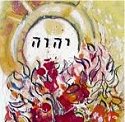
10.20.15 (Cheshvan 7, 5776) The very first time God spoke to Abram marked the beginning of the Jewish people, and the very first thing He said was lekh-lekha (לֶךְ־לְךָ), "go to yourself," by leaving behind what has previously defined your life, namely, 1) your land, 2) your relatives, and 3) your father's house (Gen. 12:1). Note that the order is reversed from what we might naturally expect, moving from the general to the specific, until ultimately we discern that we "go to ourselves" in order to leave ourselves behind... Only after this are we able to enter the land God will show us (Matt. 16:25).
וַיּאמֶר יְהוָה אֶל־אַבְרָם
לֶךְ־לְךָ מֵאַרְצְךָ וּמִמּוֹלַדְתְּךָ וּמִבֵּית אָבִיךָ
אֶל־הָאָרֶץ אֲשֶׁר אַרְאֶךָּ
va·yo·mer · Adonai · el · Av·ram
lekh-le·kha · me·ar·tze·kha · u·mi·mo·lad·te·kha · u·mi·beit · a·vi·kha
el · ha·a·retz · a·sher · ar·e·ka

Now the LORD said to Abram:
"Go from your country and your kindred and your father's house
to the land that I will show you."

"Now the LORD said to Abram, 'Go... and I will make of you a great nation, and I will bless you and make your name great, and you will be a blessing" (Gen. 12:1-2). Notice that the first letters of the phrase "and you will be a blessing" (i.e., וֶהְיֵה בְּרָכָה) are Vav + Hey (וה), which are the last two letters of the four-letter name YHVH (יהוה), which can signify "the Man (ו) of Spirit (ה)," namely Yeshua the Promised Seed (Gen. 3:15). The first two letters of YHVH of course spell Yah (יָהּ), referring to the LORD God. With the call of Abram, Vav + Hey would precede Yod + Hey, suggesting that Abram would serve as a vessel or conduit of the Divine Presence to the world. This is the deeper meaning of ve'heyeih berakhah ("and you will be a blessing"), since it meant Abram would be the direct forebear of the coming Messiah. This fascinating Hebrew wordplay also suggests that you will be a blessing, a person of Spirit (וה), when you put the LORD (יָהּ) first in your life...
Note: Regarding the promise to make Abraham's name great (i.e., וַאֲגַדְּלָה שְׁמֶךָ, in Gen. 12:2), the midrash notes that the total number of Hebrew letters in the names of the patriarchs Abraham (אברהם), Isaac (יצחק), and Jacob (יעקב) is 13; and likewise, the total number of letters in the names of the matriarchs Sarah (שׁרה), Rebecca (רבקה), Leah (לאה), and Rachel (רחל) is also 13. Furthermore 13 is the numeric value for the word echad (אחד), a word that means "unity" and represents the 13 attributes of God's Mercy (Exod. 34:6-7). The combined letters of the patriarchs and matriarchs therefore totals 26, which is the same numeric value as that for the very Name of God, YHVH (יהוה)....
Walking by Faith...

[ The following entry is related to this week's Torah reading, parashat Lekh-Lekha.... ]
10.20.15 (Cheshvan 7, 5776) Our Torah portion this week states, "And the LORD appeared to Abram and said, "To your offspring I will give this land" (Gen. 12:7). Note that this was the first time God actually appeared to Abram, since earlier he had only "heard" God say to him, "Go from your country and your kindred and your father's house to the land that I will show you" (Gen. 12:1). In other words, it was only later - after Abram had obeyed God's voice by making the move to Canaan, that the LORD appeared to him and an altar was established (Gen. 12:7-8). As long as he remained with his father in the City of Haran (the last outpost of Mesopotamia), he was in a place of delay, unable to behold the Divine Presence. Abram first had to act on what he knew before he was given confirmation by God (John 13:17). Perhaps that is why the very first place Abram came to in the promised land was the "Oak of Moreh" (אֵלוֹן מוֹרֶה), or the "Teaching Tree." Abram was taught that to believe in order to understand, not to understand in order to believe....
Notice, however, that Abram was immediately tested once he arrived in the promised land. After building another altar and calling upon the name of the LORD (Gen. 12:8), a severe famine tempted him to look for food in the land of Egypt. After leaving the land of promise, Abram willingly forfeited his identity (i.e., he denied he was Sarai's husband) and found himself powerless as his wife was abducted into Pharaoh's harem. The LORD intervened on his behalf, however, and plagued Pharaoh and his household with great plagues, which surely prefigured the future time of the great Exodus during the time of Moses...
In this connection we further note that the next time the Torah states that the LORD appeared to Abram was after he had returned from Egypt, after rescuing Lot from the kings of the east, when he encountered the mysterious Malki-Tzedek (מַלְכִּי־צֶדֶק) in Salem. After this dramatic encounter, Abram separated his clan from his nephew Lot and returned to the first altar he built in the promised land (Gen. 13:4).
Crossing Over to Life...
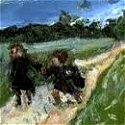
10.19.15 (Cheshvan 6, 5776) Our Torah portion this week (i.e., Lekh-Lekha) begins: "Now the LORD said to Abram, "Go (לֶךְ־לְךָ) from your country and your kindred and your father's house to the land I will show you" (Gen. 12:1). The Book of Hebrews comments, "By faith Abraham obeyed when he was called to go out to a place that he was to receive as an inheritance, and he went out, not knowing where he was going... for he was looking forward to the city that has foundations, whose designer and builder is God" (Heb. 11:8,10). The Sefat Emet says that every person of faith is likewise commanded daily to "lekh-lekha," to "go for yourself" by crossing over from the world and its deadening habits to live as an exile with God. Paradoxically, we find ourselves when we lose ourselves - when we leave behind the labels, roles, and identities this world foists upon us and instead resolve to seek the promise of God's Kingdom. As Yeshua said, "For whoever would save his life will lose it, but whoever loses his life for my sake will find it" (Matt. 16:25).
Note: In a sefer Torah (i.e., a handwritten Torah scroll), Hebrew words are written without vowels, so "lekh lekha" (לך־לך), often translated as "go forth," could be read as "go, go!" - emphasizing the importance of the mitzvah: Get moving! Start walking! Begin your journey!
Parashat Lekh-Lekha - לך־לך

[ The following is related to this week's Torah reading, parashat Lekh-Lekha... ]
10.19.15 (Cheshvan 6, 5776) Last week's Torah portion (i.e., parashat Noach) showed how the LORD miraculously preserved Noah and his family from the cataclysmic judgment of the great flood. Just as there were ten generations from Adam to Noah, so there were also ten generations from Noah to Abram (see Gen. 11:10-32). And just as Noah became the father of 70 nations, so Abram would become the father of the Jewish people, through whom the Promised Seed - the Messiah and Savior of the world - would eventually come.
In our Torah portion this week (Lekh-Lekha), we read that Abram was 75 years old, married to (his half-sister) Sarai, and guardian of his nephew Lot (his deceased brother Haran's son) when he received the promise of divine inheritance: "And the LORD said to Abram, "Go from (i.e., lekh-lekha: לך־לך) your country and your kindred and your father's house to the land that I will show you. In Hebrew, the phrase lekh lekha means "go for yourself" (lit. "walk [הָלַךְ] for yourself [לְךָ]"), though it can be interpreted it to mean "go to yourself," that is, "look within yourself" in order to begin walking out your own journey into the promises. The realm of divine promise is only attained when we venture out in faith. Like our father Abraham, we are called to "cross over," leave everything behind, and take hold of God's glorious promise for our lives.
 |
Keeping Hope Alive..

10.16.15 (Cheshvan 3, 5776) "The grass withers, the flower fades, but the word of our God will stand forever" (Isa. 40:8). This verse sets up a great contrast between olam ha-zeh and olam haba – between this present world and the heavenly realm. King David states, "Behold, you have made my days a few handbreadths, and my lifetime is as nothing before you (וְחֶלְדִּי כְאַיִן נֶגְדֶּךָ). Surely all mankind stands as a mere vanity" (Psalm 39:5). Our hearts are restless until they find their rest in God, the Eternal, the abiding, and true: "Whom have I in heaven but you? And there is nothing on earth that I desire besides you" (Psalm 73:25). To the extent that we regard this world as our "home" we will find the transience of life to be tragic; but when we regard ourselves as strangers here, transience becomes a passageway to the heavenly places.
יָבֵשׁ חָצִיר נָבֵל צִיץ
וּדְבַר־אֱלהֵינוּ יָקוּם לְעוֹלָם
ya·vesh · cha·tzir · na·vel · tzitz
u·de·var · E·lo·hei·nu · ya·kum · le·o·lam

"The grass withers, the flower fades,
but the word of our God will stand forever."
(Isa. 40:8)

Hebrew Study Card
The natural mind instinctively is afraid of change, since it implies death and dissolution, and therefore it reasons from a continuous state of dread (whether conscious or not). Hence the "besetting sin" of the flesh is to "absolutize" the moment and to otherwise regard the finite as an end in itself. But God is our "Rock," a metaphor that implies that He is the immovable foundation and cornerstone of all reality. The LORD is our strong refuge in the stormy changes we all face in this world; the Divine Presence both grounds us and sustains our way. Therefore the LORD is called El Ne'eman (אֵל נֶאֱמָן), "the faithful God." His very Name means certainty, reliability, strength, truth, reality, presence, being, life, and so on...
Whenever I read the news I am reminded that we are living in a "withered and fading world" -- nearing the prophesied "End of Days" (אַחֲרִית הַיָּמִים). But Baruch Hashem, our place (מָקוֹם) is grounded in truth that stands (i.e., יָקוּם, lit. "is raised up") forever! Yeshua is our life; he is the Word of our God that is raised up forever! So press on faith. Believing is seeing, not the other way around. "Keep yourselves in the love of God, waiting for the mercy of our Lord Yeshua the Messiah that leads to eternal life" (Jude 1:21).
Seeing the Invisible...
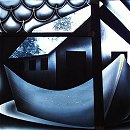
10.16.15 (Cheshvan 3, 5776) Just as Noah foresaw the great cataclysm to come, so we are to understand that the world above our heads and under our feet is destined to destruction, as we likewise await the promised world to come: "Lift up your eyes to the heavens, and look at the earth beneath; for the heavens vanish like smoke, the earth will wear out like a garment, and they who dwell in it will die in like manner; but my salvation will be forever (וישׁוּעָתִי לְעוֹלָם תִּהְיֶה), and my righteousness will never be dismayed" (Isa. 51:6).
This idea is repeated in the New Testament: "For as were the days of Noah, so will be the coming of the Son of Man" (Matt. 24:37). "But the Day of the LORD will come like a thief, and then the heavens will pass away with a roar, and the heavenly bodies will be burned up and dissolved, and the earth and the works that are done on it will be exposed. Since all these things are thus to be dissolved, what sort of people ought you to be in lives of holiness and godliness, waiting for and hastening the coming of the Day of God, because of which the heavens will be set on fire and dissolved, and the heavenly bodies will melt as they burn? But according to his promise we are waiting for new heavens and a new earth in which righteousness dwells. Therefore, beloved, since you are waiting for these, be diligent to be found by him without spot or blemish and at peace" (2 Pet. 3:10-14).
In light of all this, we look not to the things that are seen but to the things that are unseen. "For the things that are seen are transient, but the things that are unseen are eternal... For the invisible things of Him from the creation of the world are clearly seen, being understood by the things that are made, even his eternal power and Godhead. Therefore we are strangers and exiles on the earth, looking forward to the city that has foundations, whose designer and builder is God" (2 Cor. 4:18; Rom. 1:20; Heb. 11:10,13).
Faith sees the invisible... Our father Abraham was promised descendants as numerous as the stars in the sky or sand on the seashore, despite the fact that he was an old man and his wife had long past the age of bearing children. Abraham believed in the One who gives life to the dead and καλοῦντος τὰ μὴ ὄντα ὡς ὄντα "calls into existence the things that do not exist as existing" (Rom. 4:17). "He staggered not at the promise of God through unbelief but was strong in faith, giving glory to God; and being fully persuaded that, what He had promised, He was able also to perform: And therefore it was imputed to him for righteousness" (Rom. 4:19-22).
May you walk by faith, and not by sight, chaverim... Shabbat shalom!
Noah and Jesus...

10.15.15 (Cheshvan 2, 5776) We understand Noah to foreshadow the greater deliverance of Yeshua, the Savior of the world (i.e., moshia ha'olam: מוֹשִׁיעַ הָעוֹלָם). Of Noah it was said that he was ish tzaddik (a righteous man) who was tamim (blameless) in his generation: et-ha'Elohim hithalekh-noach - "Noah walked with God" (Gen. 6:9). Likewise Yeshua was entirely tzaddik (Rom. 5:19, Heb. 4:15, 1 Pet. 3:18; 1 John 2:1), blameless (Heb. 4:15, 1 Pet. 3:18), and One who walked with God (John 5:19, John 8:28, etc.). And just as Noah's obedience to God saved a remnant from all the earth, so did Yeshua's obedience result in "the saving of his house" (Heb. 11:7). Moreover, just as God "blessed Noah and his sons" (Gen. 9:1) and with them established His covenant, so in greater measure is this fulfilled in the Person of Yeshua, who provides all spiritual blessings to those whom He calls his brethren (Eph. 1:3, Heb. 13:20; Heb 2:11). Yeshua is indeed the "righteous man" who saves us in the true teivah (ark), the shelter of God's grace.
Noah's ark had God Himself as its designer (Gen. 6:14-16), and salvation in Yeshua is by God's design (Jonah 2:9; Eph. 1:9, 1:11). Noah's ark contained only one door (Gen. 6:16), just as Yeshua is the only door to salvation (John 10:9). Noah's ark contained three levels (Gen. 6:16) and salvation has three own experiential levels (2 Cor. 1:10): past, present, and future. In the past (at Moriah) Yeshua delivered us from the penalty of sin; in the present, He is delivering us from the power of sin; and in the future He will deliver us from the very presence of sin. From Noah's hand was given the sign of the dove, a symbol of peace and the abiding presence of the Spirit of God...
For more on this subject, see "Noah and Jesus: Further thoughts on parashat Noach."
Life in God's Love...

10.15.15 (Cheshvan 2, 5776) The Hebrew word for "life" is chayim (חַיִּים), a plural noun that contains two consecutive letter yods (יי) that picture two "hands held together" (the Hebrew word yad [יָד] means "hand"), or the union of our spirit with God's Spirit. The word itself reveals that there is no life apart from union with God, who extends his hand to you and says, "Live in me" (John 15:4). Yes, live in God, who is your life, your Beloved, your light, your truth, your healing, your beauty, your breath, the Center of Reality and your very salvation. Yeshua is the Source of all life, and we find nourishment, strength, and fullness of joy as we connect with his life. The Lord is our Light and our Salvation (i.e., יִשְׁעֵנוּ, our "Jesus"), the Mediator of divine life (Psalm 27:1; John 1:4). The Voice of the LORD still speaks: "Take heart. It is I; be not afraid" (Matt. 14:27).
The Hebrew word chayim can also be read as chai (חי), "alive," combined with the particle im (אם), "if," suggesting that being alive is conditional on our connection with God in the truth. "Whoever believes in the Son has eternal life (חַיֵּי עוֹלָם); whoever refuses the Son shall not see life, but the separation of God remains" (John 3:36). Life and peace are therefore inextricably connected, and those who refuse Yeshua, the Prince of Peace (שַׂר־שָׁלוֹם), therefore separate themselves from unity with God. Yeshua alone is the means of receiving the divine life: "Whoever has the Son has the life (הַחַיִּים); but whoever does not have the Son of God does not have the life" (1 John 5:12).
וְארַח צַדִּיקִים כְּאוֹר נגַהּ
הוֹלֵךְ וָאוֹר עַד־נְכוֹן הַיּוֹם
ve'o·rach · tzad·di·kim · ke'or · no·gah
ho·lekh · va'or · ad · ne·khon · hai'yom

"The path of the righteous is like the light of dawn,
which shines brighter and brighter until full day."
(Prov. 4:18)

Hebrew Study Card
"The path of the righteous is like the light of dawn, which shines brighter and brighter until full day." From the first glimmer of heaven-sent faith we detect the divine light, "the light of dawn," which continues to grow more and more until it becomes as radiant as the midday, an image of the full light of the World to Come. Praise God that more light is coming to you who are trusting in the LORD, even in your present darkness: "He who began a good work in you will bring it to completion at the day of Yeshua our Messiah" (Phil. 1:6).
Abiding in Him...

10.14.15 (Cheshvan 1, 5776) Yeshua used the allegory of a vine and its branches to illustrate how we are to be spiritually connected to Him: "I am the true Vine, and you are the branches," he said (John 15:1-6). The purpose of the branch is to be a conduit of the life of the vine. We derive our identity, life and strength from being made part of Yeshua's life, His vision, and His purposes... In Hebrew, this idea is called devakut (דְּבָקוּת) which means "cleaving" to God bekhol-levavkha (בְּכָל־לְבָבְךָ), "with all your heart," and bekhol-nafshekha (בְּכָל־נַפְשְׁךָ), "with all your soul," and bekhol-me'odekha (בְּכָל־מְאדֶךָ), "with all your being..." Cleaving to God is the essence of the great commandment to love the Lord given in the Shema. We are able to so cleave to God in Yeshua because God does a miracle and gives us lev chadash, a new heart to serve Him. We love Him because He first loved us (1 John 4:19). Whether Yeshua is living in you (and you are living in Him) is the most important question of your life upon which everything else ultimately depends. He appeals to each heart of faith: "Live in me, and I will live in you" (John 15:4). May God help us to respond to the call!
Through the Shadows...

10.14.15 (Cheshvan 1, 5776) "Whom have I in heaven but you? And there is nothing on earth that I desire besides you" (Psalm 73:25). Such is the "exile of hope" we suffer in this world... Torah begins: "In the beginning God created the heavens and the earth, and the earth was "tohu va'vohu v'choshekh" (תהוּ וָבהוּ וְחשֶׁךְ) - confusion and emptiness and darkness - which the sages interpret to mean that when we truly understand that God created the heavens and the earth, we will realize our earthy desires to be barren, empty and unreal. In their despair, Plato and the early Greek philosophers sought "timeless universals" which they believed disclosed the reality of an "upper world," a heavenly realm of unchanging goodness, beauty, and truth. Plato believed that world we experience with our senses is a shadowy place of change and decay; but the real world, discerned by clear thinking, is a place of permanence, goodness and illumination. Likewise the righteous soul trusts that despite this fleeting world that turns to dust, there is an eternal realm, a place of abiding love, and a heavenly home. The land of promise is a "foreign land" to this world, but the heart of faith beholds "the city that has foundations, whose designer and builder is God" (Heb. 11:10). "For here we have no lasting city, but we seek the city that is to come" (Heb. 13:14). Therefore "we look not to the things that are seen but to the things that are unseen; for the things that are seen are transient (πρόσκαιρος), but the things that are unseen are eternal. For we know that if the tent that is our earthly home is destroyed, we have a building from God, a house not made with hands, eternal in the heavens" (2 Cor. 4:18-5:1). In this world we suffer exile, groaning to be with our Savior, the Source of all blessing: "I say to the LORD, "You are my Lord; I have no good apart from you" (Psalm 16:2).
מִי־לִי בַשָּׁמָיִם וְעִמְּךָ לא־חָפַצְתִּי בָאָרֶץ
כָּלָה שְׁאֵרִי וּלְבָבִי
צוּר־לְבָבִי וְחֶלְקִי אֱלהִים לְעוֹלָם
mi-li · va·sha·ma·yim · ve·im·me·kha · lo-cha·fatz·ti · va·a·retz
kal·lah · she·ei·ri · u·le·va·vi
tzur-le·va·vi · ve·chel·ki · E·lo·him · le·o·lam

"Whom have I in heaven but you?
And there is nothing on earth that I desire besides you.
My flesh and my heart may fail,
but God is the strength of my heart and my portion forever."
(Psalm 73:25-26)

Hebrew Study Card
The very worst kind of exile is to be unaware that you are in exile, to be so blinded that you do not see that you do not see... As Yeshua said, "If the light in you is darkness, how great is the darkness!" (Matt. 6:23); and "be careful lest the light in you be darkness" (Luke 11:35). Ignorance is the willful "state of ignoring" moral and spiritual truth.. In the end, the world and its blind lusts will pass away, for it is "tohu" (תּהוּ) - confusion and unreality - but whoever does the will of God abides forever (1 John 2:15-17).
Those who rely on mere appearances will invariably find themselves confounded. The LORD therefore commissioned the prophet: "Go, and say to this people: 'Keep on hearing, but do not understand; keep on seeing, but do not perceive'" (Isa. 6:9). Where it is written, "God gave them over to their stubborn hearts, to follow their own devices" (Psalm 81:12; Rom. 1:24); and "they went backward and not forward" (Jer. 7:24), we learn there is no place of "neutrality" or indifference toward God. The Lord will give to you according to your faith...
The Spirit cries out, "The grass withers, the flower fades, but the word of our God will stand forever" (Isa. 40:8). This verse sets up a great contrast between olam ha-zeh and olam haba – between this present world and the heavenly realm. King David states, "Behold, you have made my days a few handbreadths, and my lifetime is as nothing before you (וְחֶלְדִּי כְאַיִן נֶגְדֶּךָ). Surely all mankind stands as a mere vanity" (Psalm 39:5). Yet we hunger and ache for love that fulfills the infinite depth of our hearts: "My soul yearns for you in the night; my spirit within me earnestly seeks you (Isa. 26:9). I say to the LORD, "You are my Lord; I have no good apart from you" (Psalm 16:2). Our hearts are restless until they find their rest in God, the Eternal, the abiding, and true...
Herald of Righteousness...

[ The following entry concerns this week's Torah reading, parashat Noach. Chodesh tov... ]
10.13.15 (Tishri 30, 5776) It is astounding to consider that Abraham personally knew the patriarch Noah (Abraham was 58 years old when Noah died), and undoubtedly Noah told him of his father Lamech, who had seen and spoken with Adam, the very first man created by God alone. Later, Abraham's son Isaac knew Shem, Noah's firstborn son, the first high priest of Salem who preserved the message of teshuvah (repentance) and retained the original promise of the coming Redeemer given by God. For this reason the New Testament calls Noah a "herald of righteousness" (2 Pet. 2:5).
 |
It is said that the righteous have three qualities. First, they are kind and just - "tzaddik" (צדִּיק); second, they are wholehearted and loyal – "tamim" (תָּמִים); and third, they "walk with God," accepting the yoke of heaven and not questioning God's actions. Noah had all three of these qualities, as it says, "Noah was a righteous man (ish tzaddik), blameless (tamim) in his generation: Noah walked with God" (Gen. 6:9).
אֵלֶּה תּוֹלְדת נחַ
נחַ אִישׁ צַדִּיק תָּמִים הָיָה בְּדרתָיו
אֶת־הָאֱלהִים הִתְהַלֶּךְ־נחַ
el·leh · to·le·dot · No·ach
No·ach · ish · tzad·dik · ta·mim · ha·yah · be·do·ro·tav
et · ha·E·lo·him · hit·ha·lekh · No·ach

"These are the generations of Noah.
Noah was a righteous man, blameless in his generation.
Noah walked with God."
Noah's righteousness is all the more remarkable because he lived in the midst of an entirely depraved and heartless culture. The "Days of Noah" (יְמֵי־נחַ) were marked by "lawlessness" (anomie), moral anarchy, violence, corruption, and complete disregard of the transcendental truth of God. "The LORD saw that the wickedness of man was great in the earth, and that every intention of the thoughts of his heart was only evil continually. And the LORD regretted that he had made man on the earth, and it grieved him to his heart" (Gen. 6:5-6). Because people denied moral reality and regarded God as unconcerned with their behavior, the LORD brought the flood to prove that He repays both the righteous and the wicked.
Note: For more on this subject, see "The Days of Noah."
The Light of Life...

10.12.15 (Tishri 29, 5776) The Tzemach Tzaddik (i.e., Menachem Mendel of Lubavitch) commented on the verse, "Let there be light" (i.e., yehi ohr: יְהִי אוֹר) by saying that God intended there should be a "lower realm," otherwise he would have created a world that beheld him directly, and that this separation was meant to be unified by means of the heart of faith... This agrees with Yeshua's teaching: "I AM the light of the world (אנכִי אוֹר הָעוֹלָם): the one who follows me will not walk in darkness, but will have the light of life" (John 8:12). Yeshua "emptied himself" to bear the light of heaven for us. The righteous are called to believe in the light that unites them with God - both in this world and in the world to come.
אנכִי אוֹר הָעוֹלָם
הַהלֵךְ אַחֲרַי לא יֵלֵךְ בַּחשֶׁךְ
כִּי־לוֹ אוֹר הַחַיִּים
a·no·khi or ha·o·lam, ha·ho·lekh a·cha·rai,
lo ye·lekh ba·cho·shekh, ki-lo or ha·chay·yim

"I AM the light of the world.
Whoever follows me will not walk in the darkness,
for in him is the light of life."
(John 8:12)

ἐγώ εἰμι τὸ φῶς τοῦ κόσμου
ὁ ἀκολουθῶν ἐμοὶ οὐ μὴ περιπατήσῃ ἐν τῇ σκοτίᾳ
ἀλλ᾽ ἕξει τὸ φῶς τῆς ζωῆς
Beginning of Reality...
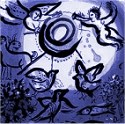
10.12.15 (Tishri 29, 5776) The Torah begins, "in the beginning God created... (Gen 1:1) to inform us that the foundation of all knowledge begins with the revelation that God is the Rosh (ראשׁ), or the Head and Source of all that exists... As the Creator of all worlds, the LORD is rosh pinnah (ראשׁ פִּנָּה), the Corner Stone of Reality... Human consciousness is the climax of creation, because through it the revelation of the spiritual would be known in all realms. This is alluded to by the Hebrew text itself: "In the beginning God created" (i.e., בְּרֵאשִׁית בָּרָא אֱלהִים) can be arranged to spell the word Hebrew word emet (אמת), or "truth."
Parashat Noach (פרשת נח)

[ The following entry concerns this week's Torah reading, parashat Noach... ]
10.11.15 (Tishri 28, 5776) Last week's Torah portion (Bereshit) showed how the mutiny of Adam and Eve caused humanity to plunge into idolatrous chaos. The subsequent generations lost sight of the LORD and became progressively steeped in moral anarchy and bloodlust, so that "every intention of the thoughts of man's heart was only evil continually" (Gen. 6:5). After just nine generations, the LORD had grown so weary of humanity that he "regretted" (i.e., yinchem: יִּנָּחֶם) creating man and "his heart was grieved" (Gen. 6:6). However, God recognized Noach (from the godly line of Seth) as a tzaddik (צַדִּיק), a righteous man of faith, and graciously made provision to save him from the wrath to come....
Noah's father Lamech (לֶמֶךְ, "powerful one") regarded his son as a deliverer who would comfort humanity from the ravages of the original curse (Gen. 5:29). Noach would give rest (נוּחַ) from the toil and vexation of life. Indeed, Noah was a "type" of savior who would rebirth the world by giving lasting comfort and rest (for more on this, see the page "Noah and Jesus"). In like manner it was prophesied that Yeshua would give us everlasting rest: "His rest shall be glorious" (Isa. 11:10), just as He offers rest to the weary (Matt. 11:28, Heb. 4:9). His sacrifice on the Cross at Moriah undoes the kelalah (curse of work) over the children of Adam. Indeed, His life, sacrifice, and resurrection was like a "magic spell" that "spoke backwards" the sin of the "First Adam" - and by means of His deliverance the power of the curse was forever broken (Gal. 3:13, John 3:14, 2 Tim.1:10; Heb. 2:14; Heb. 9:27-28; 1 John 3:8, Rev. 22:3). Yeshua is Adam ha-Sheni - the "Second Adam" - the promised Son of Man. By means of His Spirit we are given an everlasting comfort (John 14:16).
Eschatologically, the "days of Noah" are a picture of the idolatrous conditions of the world that will prevail just before the calling up of the followers of Yeshua before the time of Great Tribulation upon the earth: "As were the days of Noah, so will be the coming of the Son of Man" (Matt. 24:37). The generation of the Flood was said to be "filled with violence" (Gen. 6:13) caused by ignorance -- literally the "state of ignoring" moral and spiritual truth. Because people willingly disregarded God from their midst, they arrogated to themselves divine prerogatives: "every man did what was right in his own eyes." The resulting moral corruption and anarchy led to divine and catastrophic judgment: when God destroyed them with water, they return the world to its original state of tohu vavohu v'choshekh: "confusion and emptiness and darkness" (Gen. 1:2). This is our world today.
The seven day warning given to Noah suggests the seven year tribulation period to come (Daniel's 70th week), and also the "rapture" of the people of God who will be carried above the prophesied worldwide cataclysm. Just as God protected Israel during the time of judgment upon Egypt, so He will protect His people from the wrath of the "great Day of the LORD." But please note that "the LORD shut him in" (Gen. 7:16). Noah's teivah (ark) had God Himself as its designer (Gen. 6:15f), just as salvation in Messiah is by God's design (Jonah 2:9; Eph. 1:9, 1:11). It contained only one door (Gen. 6:16), just as Yeshua is the only door to salvation (John 10:9; 14:6). Noah's ark contained three levels (Gen. 6:16) and salvation has three own experiential levels (2 Cor. 1:10): past, present, and future. In the past (at Moriah) Yeshua delivered us from the penalty of sin; in the present, He is delivering us from the power of sin; and in the future He will deliver us from the very presence of sin. Baruch Hashem - may that day come soon!
Calendar Note: On the Biblical calendar, the month of Cheshvan (חֶשְׁוָן) immediately follows the "holiday month" of Tishri, and begins Monday October 12rd (at sundown) this year. The Torah records that God brought down the Great Flood that destroyed the world on Cheshvan 17 (Gen. 7:10-11), which lasted until Cheshvan 27 (Gen. 8:14) - exactly one calendar year after it began (Rashi notes that the 11-day discrepancy between the 17th and 27th represents the 11-day difference between the solar and lunar calendar year). Because Noah's Flood began and ended during this month, Cheshvan is generally regarded as "mar" - a time of judgment, especially regarding water (rain). Cheshvan always has a two-day Rosh Chodesh. Because rain is central to the health of the spring crops, on the 17th of the month those living in Israel begin requesting rain by adding vetein tal u'matar librakha ("and grant dew and rain for blessing") to the Amidah prayer.
יְהִי רָצוֹן מִלְּפָנֵיךָ יהוה אֱלהֵינוּ וֵאלהֵי אֲבוֹתֵינוּ
שֶׁתְּחַדֵּשׁ עָלֵינוּ חדֶשׁ טוֹב בַּאֲדנֵינוּ יֵשׁוּעַ הַמָּשִׁיחַ אָמֵן
ye·hi · ra·tzon · mil·fa·ne·kha · Adonai · E·lo·hei·nu · ve·lo·hei · a·vo·tei·nu
she·te·cha·desh · a·lei·nu · cho·desh · tov · ba'a·do·nei·nu · Ye·shu·a · ha·ma·shi·ach · A·men

"May it be Your will, LORD our God and God of our fathers,
that you renew for us a good month in our Lord Yeshua the Messiah. Amen."

Download Study Card
Heart of Wisdom...

10.09.15 (Tishri 26, 5776) The bloom of every flower is decreed by eternal purpose, and not one common sparrow is forgotten by your Heavenly Father (Luke 12:6). God's irresistible providence comprehends and orders all things, from the realm of the subatomic to the cosmic motions of the heavenly bodies. The Lord is the Center of reality: "All things were created by Him, and for Him, and in Him all things hold together" (Col. 1:16-17). In light of this overarching glory, Blaise Pascal asked, "What is left for us but to unite our will to that of God himself, to will in him, with him, and for him the thing that he has eternally willed in us and for us." The Mishnah says it this way: "Do His will as if it was your will that He may do your will as if it was His will" (Avot 2:4). In other words, what else can we do but learn to trust, accept, and to say "yes" to life – even if at times we may feel like strangers in exile... All our days are ordained; recorded in God's scroll. Therefore may God "teach us to number our days to get a heart of wisdom" (Psalm 90:12). So don't lose heart, friend; He who cares for you is a good shepherd, and you shall dwell in the house of the LORD forever.
לִמְנוֹת יָמֵינוּ כֵּן הוֹדַע
וְנָבִא לְבַב חָכְמָה
lim·not · ya·me·nu · ken · ho·da
ve·na·vi · le·vav · chokh·mah

"Teach us to number our days
that we may get a heart of wisdom."
(Psalm 90:12)

Hebrew Study Card
Moses prayed to God: "teach us to number our days," that is, help us understand how to make our days count for eternity, to have a weight of glory that will shine in the world to come... The sages say on the day of death, one considers one's life as if it had been a single day... Life goes by so quickly, and we never know when our personal Rosh Hashanah will come. "No one knows the day or hour..." That's why it is so vital to be healed and to turn to God while there is still time. So turn to him today and bacharta ba'chayim – "choose life!"
Despite the frailty and brevity of our days, may it please God to shine the power of His radiance upon us and to establish our works for His praise. May He help us to "number our days" so that we may obtain levav chokhmah (לְבַב חָכְמָה) - a heart of wisdom to live according to His will (James 1:5). Amen. Shabbat Shalom dear friends! May you be made strong and be strengthened for a new year in our beloved Saviour Yeshua!
Faith's Upward Call...
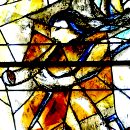
10.09.15 (Tishri 26, 5776) We must first look to the Eternal to rightly see the finite; we must look upward before we look downward (2 Cor. 4:18). As we contemplate God's Eternality and awesome power, we begin to realize the wonder and sanctity of our short time here. The Eternal is our refuge, our "dwelling place," in all generations, and that means in the present generation as well, on the other side of fleeting appearances of this world. When we pray to God as Avinu She-bashamayim, "Our Father in Heaven," we are calling to the One who (ש) is in the midst of the waters (מים) of Life.
אֲדנָי מָעוֹן אַתָּה הָיִיתָ לָּנוּ
בְּדר וָדר
Adonai · ma·on · at·tah · ha·yi·ta · la·nu · be·dor · va·dor

"O Lord, you have been our dwelling place
in every generation"
(Psalm 90:1)

In light of this, as yourself why your waste energy worrying? Take a lesson from the wildflowers... They neither toil nor spin, yet even Solomon in all his royal glory was not arrayed like one of these ... And if your heavenly Father gives such attention to the appearance of flowers, many of which grow in unseen places, surely he will attend to you, too" (Matt. 6:28-30). So take a deep breath. Don't let worry blind you to God's ongoing care; don't live as those without faith. You have a place in your Father's heart; you have a share in his house above. See the Lord as your Dwelling Place "in all generations"; behold his unchanging glory despite the fleeting shadows of this world.
Creation and Rest...

[ The following concerns this week's Torah reading, parashat Bereshit... ]
10.09.15 (Tishri 26, 5776) The general account of creation ends: "So God blessed the seventh day and set it apart as as holy, because on it God rested (שָׁבַת) from all his work that he had created to do" (Gen. 2:3). Here we note that rest (shevat) should not be thought of as idleness, that is, the mere cessation of work, since such is blessed and introduces a higher-level of existence, above the natural realm. This is likened to the "hidden blessing" that no manna fell on Sabbath so that what had been accrued could be used at that time (Exod. 16:25). The midrash says here that God rested only from the "work of this world," but not the work of heaven, that is, the ongoing work of sustaining creation by the word of his power, caring for the righteous and judging the wicked, feeding the birds and watering the lilies of the field... Therefore it was on the Sabbath day that Yeshua asked the paralytic man, "Do you want to be healed?" and then instructed him to take up his mat and walk (John 5:1-9). To those religious gatekeepers who accused him of "breaking the Sabbath" because he did this, Yeshua said, "My Father is working until now, and I am working too," a statement that enraged them even more, since they understood that Yeshua was making himself equal with the LORD God Himself (John 5:17-18).
But what about the matter of Sabbath observance? Did Yeshua "break the Sabbath" or did he rather have a different understanding of its true meaning? When he was criticized by the Pharisees for allowing his disciples to pick some grain from the fields on the Sabbath, he responded that the Holy Scriptures themselves testified that King David "broke the commandment" by eating the sacred bread reserved for the priests (i.e., the "showbread"), and noted that the priests likewise "profaned" the Sabbath by performing their avodah (service) at the Temple (Matt. 12:1-5). Yeshua then stated that "someone greater than the Temple is here" and went on to chastise his accusers by pointing out that the deeper principle of the Torah is to show mercy before sacrifice (see Hos. 6:6, Psalm 51:16-17, Prov. 15:8, Matt. 9:13, etc.). As the very "Lord of the Sabbath" (i,e., אֲדוֹן הַשַּׁבָּת, Matt. 12:8), Yeshua sanctioned acts of mercy to be performed on the consecrated day of rest. Indeed, just as the law permitted a male to be circumcised or an animal to be pulled out of a well on this day, for all the more reason should a person be healed on the Sabbath (Matt. 12:11-13). The Sabbath is not a day of (static) rest (or "non-doing") but is a means of providing rest for others by doing acts of chesed and mercy. Again, the Pharisees had confused the "inner" with the "outer" and made a category mistake. "Man was not made for the Sabbath, but Sabbath was made for man" (Mark 2:27). Of Yeshua it was prophetically said: "Out of the ground that the LORD has cursed, this one shall bring us comfort (נָחַם) from our work and from the painful toil of our hands" (Gen. 5:29).
Design and Substance...
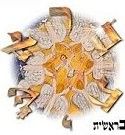
[ The following concerns our Torah reading for this week, parashat Bereshit... ]
10.09.15 (Tishri 26, 5776) "In the beginning God created the heavens and the earth, and the earth was tohu va'vohu (תּהוּ וָבהוּ) - without form and empty, and darkness was over the face of the deep..." (Gen. 1:1-2). The sages comment that knowing that God created the heavens and the earth makes us realize that by themselves earthly things are without purpose and substance, since life in the natural world is havel havalim (הֲבֵל הֲבָלִים), "vanity of vanities," apart from the design (form) and the substance of God. Faith in the upper "world" of God, that is, the heavenly realm, therefore evokes a sense of discontent and longing within the soul, and the temporal world and its pleasures will seem distracting and empty. This lack of form and emptiness was part of the original design of creation, however, since it was after God had created the universe that "he saw everything that he had made, and behold, it was very good" (Gen. 1:31).
Just as we cannot see light but by means of it we see other things, so with Yeshua, the Light of Life, the Form and Substance of God... By His illumination we are able to see the spiritual reality of God's Presence and invincible love... Yeshua is "the radiance of the glory of God and the exact imprint of his nature, and he upholds the universe by the word of his power" (Heb. 1:3). He is the Fountain of Life: by his light we see light (Psalm 36:9). Amen, God is light, and in Him is no darkness at all (1 John 1:5).
Note that some teach that there was a "gap" in time between Gen. 1:1 and 1:2 in which the devil rebelled and a cosmic war between good and evil occurred that resulted in the fall of Satan. According to this view, God "started over" by saying yehi ohr, "Let there be light" (Gen. 1:3). There is no textual evidence for such a gap, however, and indeed there are reasons to reject this view as mistaken. First, the Ten Commandments state that God created all that existed - including time, space, angels - in six days (Exod. 20:11; John 1:3). Second, the devil could not have fallen before the creation since he was created "an anointed covering cherub" while in the original paradise (see Ezek. 28:13-15). Third, the taunt of the fall of the King of Babylon prefigured the fall of Satan, where the pride of the evil one was exposed: "You said in your heart, 'I will ascend to heaven; above the stars of God I will set my throne on high; I will sit on the mount of assembly in the far reaches of the north; I will ascend above the heights of the clouds; I will make myself like the Most High' (Isa. 14:13-14). Notice that the desired ascent was above the stars, above the clouds, etc., all of which were created when God made the expanse (Gen. 1:14-18). Finally, the Scriptures state that there was no sin or death until man brought them into the world (Rom. 5:12), and, since Torah tells us everything was very good at the end of the creation week (Gen. 1:31), Satan must have fallen sometime after Adam and Eve were created...
Alphabet and Creation...

10.09.15 (Tishri 26, 5776) The Torah begins with the letter Bet (בּ) rather than the letter Aleph (א) to denote God's humility. The letter Aleph is the first letter, the king of the alphabet, and the letter that begins "I AM" (i.e., אנכי) - the first word of the Ten Commandments. The letter Bet, on the other hand, is the second letter that means "house" or "home" (בּית). This suggests that the Torah begins with the focus not on the "I" but on creation, the household of God. And though God did not wish to be the center of attention, so to speak, Aleph and Bet together spell the word "father" (אב), that is, the One who oversees the household of the world in love. As it is written, "Every good gift and every perfect gift is from above, coming down from the Father of lights (אֲבִי הַמְּארוֹת) with whom there is no variation or shadow due to change" (James 1:17).
Note: It may be wondered why we would say that God is humble... Well, it is certainly true that the LORD is self-effacing, self-forgetting, utterly unselfish, absolutely noble of heart, and so on. Moreover we are commanded to emulate God, who is merciful, gracious, slow to anger, abounding in steadfast love, etc. (Exod. 34:6-7). Most of all we are to follow the example of Yeshua, YHVH in the flesh, who willingly emptied Himself and took the role of a humble servant (Phil. 2:6-7). Yeshua himself said, "Take my yoke upon you, and learn from me, for I am gentle and lowly in heart, and you will find rest for your souls" (Matt. 11:29).
Signature of God...
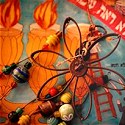
[ The following entry concerns this week's Torah reading, parashat Bereshit... ]
10.09.15 (Tishri 26, 5776) The midrash teaches that the phrase, "the beginning [i.e., "head"] of your word is truth" (Psalm 119:160) applies to the first sentence of the Torah, namely, "In the beginning God created the heavens and the earth" (Gen. 1:1), since the word "beginning" (i.e., bereshit: בְּרֵאשִׁית) literally means "at the head [i.e., rosh: ראשׁ] of," referring to God's preeminent creative power. In the Hebrew text we note that the last letters of the words bara Elohim et (בָּרָא אֱלהִים אֵת), in Genesis 1:1, spell the word "truth" (i.e., emet: אֱמֶת), as do the last letters of the words that summarize the account of the creation given later: bara Elohim la'asot (בָּרָא אֱלהִים לַעֲשׂוֹת), in Genesis 2:3. This is why the sages sometimes say the "signature" or "seal" of God is truth, as if God Himself "signed the account" of the creation of the universe using His own hand...
ראשׁ־דְּבָרְךָ אֱמֶת
וּלְעוֹלָם כָּל־מִשְׁפַּט צִדְקֶךָ
rosh · de·va·re·kha · e·met
u·le·o·lam · kol · mish·pat · tzid·ke·kha

"The beginning of your word is truth,
and every one of your righteous rules endures forever"
(Psalm 119:160)
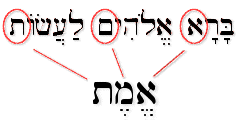 |
The idea that God created the universe "to do" (לַעֲשׂוֹת) His will has been interpreted to mean that it is our responsibility, as God's creatures made in His image, to participate in the "doing" of His work. "Never say, 'What does all this have to do with me? as if you were not a part of creation." Yeshua is the Word of God, the Truth of God, the Way of God, the Life of God, and the One who breathes out nishmat chayim, the "breath of your life." Therefore we follow Him by sharing the message of God's redemptive love for the world.
Note: The Lekhivitzer Rebbe said, "The Torah begins with the word 'bereshit' (בְּרֵאשִׁית), which can be understood to say 'God created the world for the sake of the beginning.' All the Creator asks is that you make a beginning, that you turn in the right direction." Indeed, we never really get past the first steps made in earnestness toward God. In that sense we are "always beginning," since we are never beyond the first need of the heart to turn to God. We are all incomplete, awaiting the end for which we were created, and therefore we are always calling on the LORD, always abiding in Him, always seeking His face...
Olam Malei - An Entire World...

10.08.15 (Tishri 25, 5776) God made you entirely unique, and no one else was created for the special role that you have in the overarching plan of Almighty God... Jewish tradition says that God created Adam alone as "olam malei" (עוֹלָם מָלֵא), "an entire world," to teach that each individual is of great value and significance. "Thus anyone who sustains one individual has sustained the world; and anyone who destroys one individual has destroyed an entire world" (Sanhedrin 37a). In addition, God created man as a solitary creation to remind all people that they descend from a common source: No one has a greater or better lineage or "pedigree" than anyone else. Moreover, each of us is created with a radical sense of "aloneness," a built in "hunger" for relationship and especially for God's presence. Therefore the very first commandment to Adam and Eve comes in the form of a blessing: "And God blessed them and said, פְּרוּ וּרְבו / pru urvu: "be fruitful and multiply" (Gen. 1:28). People were created to be in fellowship with others and with God, and when this is lacking, there is a profound soul hunger and need....
Mystery and Creation...

[ The following is related to our Torah portion for this week, parashat Bereshit. Please review the Torah portion to find your place here... ]
10.08.15 (Tishri 25, 5776) Why is there something rather than nothing? Why does anything exist at all? These are basic questions about the meaning of life. Where do we come from? What are we? Where are we going? "God created the universe," you say, yes, but exactly why did He do so? What purpose did he have in mind? In particular, why were you created? What is the purpose of your life? What do you hope to achieve with the limited amount of time you have on this earth? Such questions brood within the soul, even if they are hidden from consciousness by various forms of busyness and distraction. At the outset of serious thinking about anything at all we are confronted with such ultimate questions. What is real? Why are we here? Where are we going? What does God want from us?
"Where am I? Who am I? How did I come to be here? What is this thing called the world? How did I come into the world? Why was I not consulted? And If I am compelled to take part in it, where is the director? I want to see him." - Soren Kierkegaard
The Torah begins: "In the beginning God created..." (Gen. 1:1). No explanation is given, simply the mysterious declaration that God's eternal power is behind the realm of the world of appearances. We only begin to get some idea of God's hidden purposes as he reveals his design in Scripture. There we learn that God chose to create the universe yesh me'ayin, "out of nothing," in order to share his wisdom, glory, and love with other beings He created. "You created all things, and for Thy pleasure they are and were created" (Rev. 4:11). All this was for the sake of the Messiah, who built the world in chesed (חֶסֶד) and who forever reigns as the King of eternal life and love. "For from him and through him and to him are all things" (Rom. 11:36). The purpose of your life is to learn that you are beloved by God, to know and receive the infinite worth you have in his eyes, and to share that love with others. Indeed, you were created to be made part of God's great family, the Kingdom of Love...
For more on this topic see: "Creation and the Kingdom of Love..."
The Song of Desire...

[ The following is related to our Torah portion for this week, parashat Bereshit... ]
10.07.15 (Tishri 24, 5776) The midrash says that the word "bereshit" (בְּרֵאשִׁית) can be arranged to spell shir te'ev (שִׁיר תְּאֵב), meaning the "song of desire." This is the holy plea sounded by all of creation to be made whole, healed, and ultimately perfected. As it says in our Scriptures: "For the creation was subjected to futility, not willingly, but because of him who subjected it in hope" (Rom. 8:20). Therefore when we take hold of Yeshua's heart, vision, and mission, we partake in the repair of the world (תיקון עולם) by testifying of God's healing love given in Messiah. We begin and end our journey to life with the "song of desire" on our lips – that is, with our heart awakened to its need for God. As it says: "The LORD is near to all who call on him, to all who call on him in truth. He fulfills the desire of those who fear him; he also hears their cry and saves them" (Psalm 145:18-19).
אֲנִי לְדוֹדִי וְעָלַי תְּשׁוּקָתוֹ
ani · le'do·di · ve·a·lai · te·shu·ka·to

"I am my beloved's, and his desire is upon me."
(Song 7:10)

Seedbed of Creation...

[ The following is related to our Torah portion for this Shabbat, parashat Bereshit... ]
10.07.15 (Tishri 24, 5776) The Scroll of Genesis (סֵפֶר בְּרֵאשִׁית) is truly the "beginning," the "root," and the "seedbed" of all the subsequent Scriptures - including the message of Yeshua and the revelation of the New Testament. In Genesis we see the creation and ruin of man through sin, but we take hold of the promise of deliverance through the coming Seed of the woman; in the Book of Exodus (שְׁמוֹת) we see God's powerful redemption secured through the blood of the Lamb; in the Book of Leviticus (וַיִּקְרָא) we encounter communion and atonement in the holy sanctuary; in the Book of Numbers (בַּמִדְבַּר) we experience the leading of God through desert places, and in the Book of Deuteronomy (הַדְּבָרִים) we are renewed by God's faithfulness before we take hold of our inheritance. Ultimately, the concluding book of the Bible, the Book of Revelation, serves as a climactic "final chapter" of the story begun in Genesis, where the Tree of Life (עֵץ הַחַיִּים) is restored to the midst of the paradise of God, and the presence of sin and death have been forever eradicated....
Everything begins with the foundational truth that Almighty God is our personal Creator (הַבּוֹרֵא). This is the first principle of all rational thinking: "In the beginning (בְּרֵאשִׁית), God created the heavens and the earth" (Gen. 1:1). Notice that the word "beginning," i.e., bereshit, comes from the word reishit (רֵאשִׁית), meaning first or best (Psalm 111:10), which does not necessarily mean "the beginning" in a temporal sense (הַרִאשׁוֹן), but rather primacy or rulership over all that exists. Indeed, the word includes the root idea of "head" (ראשׁ), which suggests the "head of all things," that is, to the Messiah, the Creative Word of God who is the "head of all beginning and authority" and through Whom and for Whom all things were created (Col. 1:16; 2:10).
For more on this subject, please see: Genesis and the Seedbed of Creation.
Creation for the Messiah...
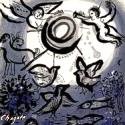
[ The following is related to our Torah portion for this week, parashat Bereshit... ]
10.07.15 (Tishri 24, 5776) The Talmud says "All the world was created for the Messiah" (Sanhedrin 98b). Likewise the New Testament had earlier said: "All things were created by Him (i.e., Yeshua), and for Him" and in Him all things consist (συνεστηκεν, lit. "stick together") (Col. 1:16-17). The first word uttered by God, "Let there be light" (Gen. 1:3), was uttered on behalf of all who would behold His glory, as it is written, "Arise, shine forth, for your light has come" (Isa. 60:1). When Adam first opened his eyes and human consciousness was born, he immediately understood that the LORD created all things, including himself. According to midrash, Adam's first words were, יהוה מֶלֶךְ עוֹלָם וָעֶד / Adonai malakh olam va'ed: "The LORD is King for ever and ever." God then said, "Now the whole world will know that I am King," and He was very pleased. This was the "tov me'od" (טוֹב מְאד) moment of creation, when God saw all that He had made "and found it very good" (Gen. 1:31). Therefore the name for man (i.e., adam: אָדָם) is connected with the word for "very" (i.e., me'od: מְאד): the birthday of humanity is therefore the Coronation Day for the King of the Universe.
The implication that the LORD God is our Creator is enormous and pervades everything else in our lives. God's creative power is witnessed by all conscious life. The Divine Light that was created before the sun and the stars represents God's immanent presence that "lights up" all of creation - including our minds (Gen. 1:3). Since we were created b'tzelem Elohim, "in the image of God," the witness of God's truth is foundational to all of our thinking as well. The revelation (not the invention) of logical first principles is part of God's "signature," if you will, of how the mind is wired to reality. Likewise we have intuitive awareness regarding the existence of moral truth (i.e., the standard of justice and moral law), aesthetic truth (i.e., ideals of beauty, goodness, worth, and love), and metaphysical truth (i.e., cause and effect relationships). "The heavens are recounting the glory of God, and the expanse is proclaiming his handiwork" (Psalm 19:1). God's power and presence can be clearly inferred from the tremendous effect of the universe itself. As Paul stated, "the invisible things of Him (τά ἀόρατα αὐτοῦ) from the creation of the world are clearly seen (καθοράω), so that people are without excuse" (Rom. 1:19-20). It is the fear of the LORD (יִרְאַת יהוה) that is truly the beginning of wisdom and knowledge (Psalm 111:10; Prov. 1:7; 9:10). The Hebrew word for fearing (ירא) and seeing (ראה) share the same root. We cannot truly see reality apart from reverencing God as the Lord and King of Creation.
It was asked for what purpose mankind was created. One said to purify the soul; another said to gain wisdom; another to serve God. Nay, but understand that man was created to elevate the heavens, to celebrate the heart of the Father, and to be needed by heaven's embrace... To focus on ourselves, on our purification, our "religion," misses the greater point that only God's love makes true life possible....
Creation and the Torah...
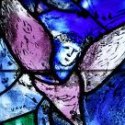
10.06.15 (Tishri 23, 5776) The sages sometimes say the world was created for the sake of Torah (למען התורה), which finds its audience and expression within the Jewish heart. "It is possible that a king would build a palace breathtaking in its splendor, which serves no other true purpose except to provide shade for the truly righteous soul, thus saving him from death" (Rambam). The entire cosmos is likened to a palace that was created for the sake of revealing God's great deliverance, as it is written: "God has chosen us in him before the foundation of the world, that we should be holy and blameless before him" (Eph. 1:4). "Come, you blessed of my Father, inherit the kingdom prepared for you from the foundation of the world..." The goal or purpose of God's creative activity was the building of a kingdom based on divine love (מַלְכוּת הָאֱלהִים). As King David wrote, עוֹלָם חֶסֶד יִבָּנֶה / olam chesed yibaneh: "The world is built with chesed" (Psalm 89:2). The world itself is ordained upon the foundation of God's love as it is expressed in the lives of the tzaddikim (the righteous).
Spelling out "Bereshit"...
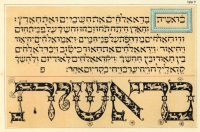
[ The following is related our Torah portion for this week, parashat Bereshit... ]
10.06.15 (Tishri 23, 5776) The 18th century Torah sage Vilna Gaon taught that the Hebrew word "bereshit" (בְּרֵאשִׁית), which is the very first word of the Bible, may be thought of as an acronym for meaningful spiritual life. The first letter, Bet (בּ), stands for bittachon (בִּטָּחוֹן), a word that means complete trust in God's love for your life; the next letter, Resh (ר), stands for ratzon (רָצוֹן), or the desire to live according to God's will; the central letter Aleph (א) stands for ahavah (אַהֲבָה), which is the love for God and for our fellow man (Deut. 6:5; Lev. 19:18); and the letter Shin (שׁ) is for shetikah (שְׁתִיקָה), or "keeping silent," which is the cardinal virtue of godly self-control and wisdom (James 1:26; 3:1-18; Psalm 34:13; Prov. 13:3, etc.). The letter Yod (י) is for yirah (יִרְאָה), or reverence for God's authority and dignity; and finally, the letter Tav (ת) is for Torah (תּוֹרָה), the study of which brings transformation and sanctity to your life (Psalm 19:7; Psalm 119:105; Prov. 6:23; Matt. 5:17-19; 2 Tim. 2:15-16).
The Divine Light...

10.05.15 (Tishri 22, 5776) The Scriptures reveal that the Word of God (דְּבַר הָאֱלהִים) created the universe and indeed all possible worlds (בְּרֵאשִׁית הָיָה הַדָּבָר). When the Divine Voice (i.e., the Word of God) spoke cosmic Light into existence (Gen. 1:3), God was not creating the physical light of the Sun or the stars since the heavenly bodies were created later (see Gen. 1:14). This supernal light was the first expression of God's handiwork outside of Himself, His first revelation of contingent existence (i.e., existence that owes its source, continuance, and end to God's transcendent power and will). The Divine Light formed the canvass, if you will, of God's portraiture of creation (in three-dimensional terms, the Divine Light formed a sort of "container" that became the "house" or "place" of Creation). Among other things, this means that ultimate reality is grounded in the Source of Light, Love, and Truth -- regardless of how dark the present hour may appear. Indeed God's Name YHVH (יהוה) means Being Itself (הָיָה וְהֹוֶה וְיָבוֹא): God is always present, and therefore we call upon Him in our time of need (Heb. 4:16).
Addendum: I was asked by someone regarding the sequence of the days of creation, and in particular, how God created plant life on the third day, before the creation of the sun and the stars on the fourth day (cp. Gen. 1:11-13, Gen. 1:14-17). In response, we surmise that the original light functioned as a light source for the first three days, but on the fourth day God "separated" or "divided" it to create the realm of the sun and stars.... The sages say this is alluded to by the language used in the passage: "And God said, "Let there be lights" (יְהִי מְארת) in the firmament of the heaven to divide (לְהַבְדִּיל) the day from the night; and let them be for signs, and for seasons, and for days, and years. And let them be for lights in the firmament of the heaven to give light upon the earth: and it was so" (Gen. 1:14-15). The Hebrew phrase yehi morot (יְהִי מְארת), "let there be lights," literally reads "let it be lights," where "it" refers to the original light of creation that was mentioned in Genesis 1:3-5.
For more on this subject, see "Covenant of Fire."
Torah's First Day...

10.05.15 (Tishri 22, 5776) Concerning the account of creation of the first day (i.e., Gen. 1:3-5), the midrash notes the word light (אוֹר) appears five times, one for each of the five books of Torah: 1. "Let there be light" (יְהִי אוֹר) refers to the Book of Genesis (Bereshit) and how God created the world with light; 2. "And there was light" (וַיְהִי־אוֹר) refers to the Book of Exodus (Shemot), the light of redemption from the darkness of exile; 3. "God saw that the light was good" (וַיַּרְא אֱלהִים אֶת־הָאוֹר כִּי־טוֹב) refers to the book of Leviticus (Vayikra) and the sacrifices at the altar; 4. "God separated the light from the darkness" (וַיַּבְדֵּל אֱלהִים בֵּין הָאוֹר וּבֵין הַחשֶׁךְ) refers to the Book of Numbers (Bamidbar), and how Israel separated themselves from their past and how the clouds of glory illuminated their way; and finally, 5. "God called the light day" (וַיִּקְרָא אֱלהִים לָאוֹר יוֹם) refers to the Book of Deuteronomy (Devarim), the retelling of the Torah (מִשְׁנֵה הַתּוֹרָה), which distills the commandments that enlighten the heart of faith, as it says, "mitzvah is a lamp and the Torah is light" (Pr. 6:23).
Beginning Again, Again...

[ The following is related to Simchat Torah and the great value of Torah study for our lives... ]
10.04.15 (Tishri 21, 5776) Each week in synagogues across the world a portion from the Torah (called a parashah) is studied, discussed, and chanted. Jewish tradition has divided the Torah into 54 of these portions - roughly one for each week of the year - so that in the course of a year the entire Torah has been recited during services. The final reading of this cycle occurs on the holiday of Simchat Torah ("Joy of the Torah"), a festival celebrating both the completion of the year's Torah Reading cycle as well as the start of a brand new cycle. Each year, then, we "rewind" the scroll and begin again. The sages have wisely said that you cannot compare studying Torah for the 49th time to studying it for the 50th time....
Our spiritual inheritance is bound up with the Torah: it is part of our story, our history, our heritage (Deut. 33:4; Gal. 3:7; Rom. 4:16; Luke 24:27). The stories of Torah serve as parables and allegories that inform the deeper meaning of the ministry of Messiah: "Now these things happened to them as an example, but they were written down for our instruction, on whom the end of the ages has come (1 Cor. 10:11). "For whatever was written in former days was written for our instruction, that through endurance and through the encouragement of the Scriptures we might have hope" (Rom.15:4). You are no longer a stranger or outsider to the heritage of the LORD (Eph. 2:19). Disciples of Yeshua are called talmidim (תַּלְמִידִים) -- a word that comes from lamad (לָמַד) meaning "to learn." Among other things, then, following the Messiah means becoming a student of the Scriptures He loved and fulfilled (Matt. 5:17-18; Luke 24:44-45). Only after learning from Yeshua as your Teacher will you be equipped to "go to all the nations and teach" others (Matt. 28:19).
Surrounded by His Sukkah...

[ The following concerns the holiday of Sukkot, called "Tabernacles" in the Christian tradition... ]
10.02.15 (Tishri 19, 5776) The root idea of the word "sukkah" means to cover or surround, as in hedge of protection. The Hebrew root is used when Moses asked to behold God's glory and the meaning of the name YHVH (יהוה), and God said, "Behold there is a place by me where you shall stand on the rock, and while my glory overtakes you I will cover you with my hand (וְשַׂכּתִי כַפִּי עָלֶיךָ) until I have passed by (Exod. 33:21-21). The hand of God (יַד־יְהוָה) is our sukkah, and indeed the LORD writes our names upon his palms and sets us as a seal upon his heart (Isa. 49:16; Sol. 8:6). Likewise David affirmed that God would treasure you within his sukkah and elevate you upon the Rock that is Messiah:
כִּי יִצְפְּנֵנִי בְּסֻכּה
בְּיוֹם רָעָה יַסְתִּרֵנִי בְּסֵתֶר אָהֳלוֹ
בְּצוּר יְרוֹמְמֵנִי
ki · yitz·pe·nei·ni · be·suk·koh
be·yom · ra·ah · yas·ti·rei·ni · be·se·ter · a·ho·lo
be·tzur · ye·ro·me·mei·ni

"For he will cover me in his sukkah
in the day of trouble he will hides me in the secret place of his tent;
on the Rock he elevates me"
(Psalm 27:5)
The LORD will "store you" as a treasured person (the word tzafan [צָפַן] means to treasure) in his sukkah, a symbol of his protection of your soul... in the day of trouble he will hide you in his tent, that is, within his dwelling place, under the shadow of his wings he makes you refuge; he will elevate you upon the Rock which is Messiah (1 Cor. 10:4).
Since God's Name (יהוה) means "Presence," "Breath," "Compassion," "Love," "Healing," and so on, we are surrounded by his Sukkah at all times... In other words, you don't have to be in a physical sukkah to be in His sukkah! May God open our eyes to see his glory!
SHABBAT SHALOM AND HAPPY SUKKOT, dear friends!
Enshrining the Name...

10.02.15 (Tishri 19, 5776) According to Rashi, Moses gathered the people to assemble the Mishkan (i.e., "Tabernacle") the day following Yom Kippur, that is, the day after he came down from the mountain upon learning the inner meaning of the name YHVH (Exod. 34:6-7; 35:1-35). For this reason it is traditional to begin building your sukkah on the day following Yom Kippur, recalling the revelation of the covenant of God's mercy: "The LORD is my strength and my song, and he has become my salvation (my Yeshua); this is my God and I will enshrine Him" (Exod. 15:2). By extension, the sukkah is regarded as "mikdash me'at" (מִקְדָשׁ מְעַט), a little version of the Tabernacle itself, a humble sanctuary God would dwell...
עָזִּי וְזִמְרָת יָהּ וַיְהִי־לִי לִישׁוּעָה
זֶה אֵלִי וְאַנְוֵהוּ אֱלהֵי אָבִי וַאֲרמְמֶנְהוּ
o·zi · ve·zim·rat · Yah · vai·hi · li · li·shu·ah
zeh · E·li · ve·an·ve·hu · E·lo·hei · a·vi · va·a·ro·me·men·hu

"The LORD is my strength and my song, and he has become my salvation;
this is my God and I will enshrine Him, God my Father, and I will exalt Him"
(Exod. 15:2)

A midrash dating from the 2nd century BC says that we are to be joyful during Sukkot because it was at this time that Isaac was born: "And we returned in the seventh month, and found Sarah with child before us, and we blessed him, and we announced to him all the things which had been decreed concerning him (Jubilees 16:16). Moved by gratitude to God, Abraham established a festival of joy to celebrate the birth of his long-awaited son by decorating booths (sukkot) and thanking HaShem for the miracle of his heir. "And Abraham took branches of palm trees, and the fruit of goodly trees, and every day going round the altar with the branches seven times [a day] in the morning, he praised and gave thanks for all things in joy" (Jubilees 16:31). In other words, Sukkot originally celebrates the birth of Isaac - and by extension, the birth of Yeshua our Messiah, the Akedah of God (Gen. 26:5).
Yeshua the Hidden Guest...

[ The following is related to the holiday of Sukkot, or the Feast of Tabernacles... ]
10.02.15 (Tishri 19, 5776) The Aramaic word "ushpizin" (אוּשְׁפִּיזִין) refers to the seven "mystical guests" who are said to (metaphorically) visit us during the festival of Sukkot, namely: Abraham, Isaac, Jacob, Joseph, Moses, Aaron, and David, respectively. According to Jewish tradition, on each night a different guest (i.e., ushpiz: אוּשְׁפִּיז) enters the sukkah, and we are to symbolically welcome them by offering them a place at our table (this is similar to the tradition of Elijah's Cup during Passover). On the first night comes Abraham; on the second, Isaac, and so on. In the Gospel of John we read that Yeshua said he go up to the Feast of Tabernacles "in secret" (ἐν κρυπτῷ), like an ushpiz (John 7:10). During the "middle of the festival," perhaps on the fourth day (the "Day of Joseph"), Yeshua went to the Temple and began teaching the people (John 7:14), and on the last great day, called Hoshana Rabbah, when the High Priest led a parade to the pool of Siloam during the water libation ritual, Yeshua stood up and cried out, "If anyone thirsts, let him come to me and drink" (John 7:38). Finally, after the legendary "light show" at the Temple, on the morning following the festival (called Shemini Atzeret), Yeshua returned to the Temple and said, "I am the light of the world. Whoever follows me will not walk in darkness, but will have the light of life" (John 8:12), recalling the words of the prophet: "On that day there shall be no light... and living waters shall flow out of Jerusalem; And the LORD will be king over all the earth. On that day the LORD will be one and his name one" (Zech. 14:6,9; Isa. 13:10; 30:26).
Note: For more on this see, "The Seven Ushpizin: Yeshua as the Hidden Guest."
Wholeness and Faith..

10.01.15 (Tishri 18, 5776) The Book of Ecclesiastes (megillat Kohelet) is read during the holiday of Sukkot, though you might be surprised to learn that many of the early sages did not want it included as part of the Jewish Scriptures. After all, the philosophy of Kohelet - that we are incapable of fully understanding the purposes of the world, and therefore much of what we think is important is really havel havalim (הֲבֵל הֲבָלִים), "vanity of vanities" - is contrary to a theology of reward and punishment found in the writings of Moses. This question is not unlike the Book of Job and the mysterious question as to why the righteous suffer... It is to their credit that the sages finally decided to include the scroll as part of the accepted canon, however, since it takes great humility to admit that we must continue to seek God, despite uncertainty and transience of this world. Indeed, we read this book to remind us that lasting meaning and purpose is not found in life lived "under the sun" but rather in knowing and serving God. Solomon therefore concludes his existential reflection as follows: "Fear God and keep his commandments: ki zeh kol-ha'adam (כִּי־זֶה כָּל־הָאָדָם), "for this is the whole man" (Eccl. 12:13), which suggests that those who revere the LORD and obey His Word will be healed of despair and inner vanity...
סוֹף דָּבָר הַכּל נִשְׁמָע אֶת־הָאֱלהִים יְרָא
וְאֶת־מִצְוֹתָיו שְׁמוֹר כִּי־זֶה כָּל־הָאָדָם
sof · da·var · ha·kol · nish·ma · et · ha-E·lo·him · yir·a
ve·et · mitz·vo·tav · she·mor · ki · zeh · kol · ha·a·dam

"Let us hear the conclusion of the whole matter: Fear God
and keep his commandments: for this is the whole man."
(Eccl. 12:13)

Download Study Card
"The grass withers, the flower fades, but the word of our God will stand forever" (Isa. 40:8). Note the great contrast between olam ha-zeh and olam haba – between this present world and the heavenly realm.... Unlike the grass of the field that dries up or flowers that soon fade, the word of God stands forever. And despite the frailty of man and the inevitability of physical death, God's truth endures, which is a foundation upon which we can rest.
Note: For more on this topic, see: "Sukkot and Vanity..."
A Prophetic Rejoicing...
 |
10.01.15 (Tishri 18, 5776) Regarding the holiday of Sukkot ("Tabernacles") the Torah states, ve'samchta be'chagekha - "you shall rejoice in your holiday" and ve'hayita akh same'ach - "you shall have nothing but joy" (Deut. 16:14-15). But how can Torah command us to rejoice? Can we be forced to dance, sing, and make merry? Holocaust survivor Elie Wiesel wrote, "Ve'samchta be'chagekha (וְשָׂמַחְתָּ בְּחַגֶּךָ) is said to be the most difficult commandment of Torah, but I could never understand why. Only during the war did I understand. Those Jews who, in the course their journey to the end of hope, managed to dance on Simchat Torah... taught us how Jews should behave in the face of adversity. For them, ve'samchta be'chagekha was one commandment impossible to observe -- yet they observed it." In this connection, let me add that these words are ultimately prophetic: "you shall rejoice; you shall have nothing but joy...." That day is coming, when our tears are wiped away and our wounds are forever healed. Amen. Chag Sukkot Same'ach, friends...
Personal Update: Please remember me, John, in your prayers friends... I have been sick the last couple days and it's been difficult getting any sleep. Thank you so much...
|


